#trauma and cult tactics
Explore tagged Tumblr posts
Text
I feel like people aren’t legally obligated to have an opinion on the light-heartedness or darkness of the tone of the kh series until they learn that the main character, a fourteen year old boy, commits suicide in the first game
#tw suicide#suicide#i saw a youtube video that was titled 'kh is a dark series????' and i never wanted to attack a person more#the first game came out in 2002#not to mention that every game ends with the main character not getting what they wanted#except for maybe kh2 and even then thats debatable#they're all tragedies#like kh sets the tone and its a downhill slope from there#like the amount of gaslighting and manipulation#dehumanization and mental illness#human experimentation#trauma and cult tactics#the fucking CHILD WARS#the copious amounts of murder and attempted murder outside of the war context#all neatly hidden under a layer of hypersaturization and disney
25 notes
·
View notes
Text
something that's really been bothering me lately is how the church i was a part of would like... repackage doctrine to make it sound nicer and more acceptable. like, the belief that all humans are evil by nature and deserve eternal torture for the crime of existing is inherently violent and cruel. but my church didn't frame it like that. they framed it as "yes we're ALL evil and wicked and we ALL deserve hell to atone for our sin (being human) BUT god loves you despite you not deserving love or happiness or anything good at all and all you have to do to avoid the pits of hell is accept jesus as your savior isn't that so amazing????" and they framed the crucifixion as this beautiful, selfless act of god by taking our place on the cross instead of "this all-powerful being who created all the rules decided that he required torture, death, and human sacrifice to be able to tolerate us". and it's not "women will be viewed as lesser than men" it's "women must submit to their husbands the same way we all must submit to god it's not dehumanizing it's holy and yes women have different roles but that doesn't make them lesser than and sure we don't have any women in leadership positions in the church and we would never even consider it, come on now that's ridiculous, but that's just because men are supposed to lead because men and women are different and created for different purposes it's just biology". and there are plenty others! i know that the reframing of everything is part of how they can even get people to accept the doctrine in the first place, but being on the outside of it is kind of horrifying. when you get down to the actual beliefs that are held without the distortions and manipulation, so many are violent, cruel, dehumanizing, abusive. but they distort and manipulate these beliefs to make them seem acceptable, morally correct, and redefine what love is and should look like.
#this version of xtianity primes you for abuse!!!!!#like. inherently in the doctrine they preach and accept#and they get away with it because they're nice about it and really good at marketing it as something different#ex cult#ex christian#ex fundamentalist#religious trauma#cult tactics#information control
662 notes
·
View notes
Text
A Ramble on Grimwald, My Golden Guard OC
To start, the name “Grimwald” means “prevail,” which is one of the ways that inspired my design of his personality despite intending it initially as a morbid joke.
I made Grimwald based on the idea that he develops Philip’s obsessive behavior growing up, but aimed at Philip himself. I personally headcanon that Philip hand-makes each of the Grimwalkers a special item (like Sprig for Hunter) to foster attachment and dependency to him. So, when he’s about six, Grimwald gets a quilt that he keeps literally until the day he dies. He finds out about the Grimwalkers when he’s sixteen.
What happens is that Philip turns into his beast form and flees up to the Titan’s skull. Grimwald follows him and eventually catches up on the bridge area. Philip grabs him and YEETS him off the side in a moment of anger, but Grimwald survives the fall using magic (even if he does get beat up). He lands in the Golden Guard pit and sees all the bodies/masks. Obviously traumatized, he cries for a while but makes no move to leave. Philip eventually comes down after regaining control to see if Grimwald died.
However, Grimwald immediately runs up to him, throws his arms around him, and asks to go home (back to the palace). Philip is surprised but intrigued, so he allows this to happen. Grimwald doesn’t ask about it and continues about his duties until Philip kind of goes, “Aren’t you curious about what that was?” And Grimwald says he was waiting for Philip to be ready to talk about it because he doesn’t want to push him.
So Philip decided to do what he does best and manipulate a child. He tells Grimwald that he is a human and Caleb is his brother reincarnated of brought back from the dead because he failed to stay with him (Philip) like he (Caleb) promised in his first life.
Philip gives a heavily altered course of events that paint him as the good guy, witches as the bad guys, and Caleb as bewitched and an abandoner. This makes Grimwald feel immense responsibility for Caleb’s actions, and he makes an Everlasting Oath to never abandon Philip as long as he lives.
After that, Grimwald refuses to leave Philip’s side unless ordered to and always returns as quickly as possible to him, placing emphasis on efficacy and ruthlessness to please Philip. He additionally becomes convinced that the only reason he connects with witches is because he is “tainted” by the Grimwalker form and basically gaslights himself into dehumanizing witches and that his empathy for them is entirely because he is a flawed reincarnation.
During time when there are not other witches around, Grimwald tries to recreate himself as “Caleb” by acting brotherly towards Philip and attempting to simulate that relationship again. It works fairly well, and Philip sometimes slips up and calls him “Caleb” (which Philip is really proud of because he sees it as proof he’s succeeding).
However, Grimwald begins to detest his appearance because it does not look the way that it used to “when he was human.” This leads to an incident where he tries to cut his ears to look human but is stopped by Philip. During the time after the revelations, Grimwald only communicates with people other than Philip out of necessity.
The whole thing lasts four years, with Philip slowly realizing that Grimwald is becoming self-destructive due to the guilt he feels. He will risk punishment and danger rather than failure, but it has lead to medical expenses for healing and hospital trips due to lack of self care.
Grimwald’s last mission is one where he is sent after a shapeshifter type of creature similar to Grom. It turns into Philip upon seeing Grimwald, and the latter feels to terrified and worried to harm it simply because it has the appearance of his creator. Grimwald dies in the ensuing fight, and the creature runs off. He is twenty years old when that happens.
He doesn’t initially realize he is dead when he wakes up as a ghost. He returns to the palace, ready to accept his punishment. But Philip doesn’t acknowledge him. Grimwald thinks he is getting ignored for failing, so he just sits in the throne room until a scout comes in to bring Philip news of his death. Afterwards, Grimwald spends much of his time watching Philip and his successor (Darius’s mentor) before beginning to leave the castle and wander around the Isles once Hunter is created.
#The Owl House#Emperor Belos#Philip Wittebane#Caleb Wittebane#Grimwalkers#Golden Guard OC#TOH OC#character ramble#I’m honestly just projecting onto a blank canvas#Ramble#character lore#technicall canon compliant?#It could happen#My daddy issues are showing#Trauma#the Golden Guards need therapy#Cult tactics#Philip “manipulate mansplain murder” Wittebane#Gaslighting#self-dehumanization#Philip “Gaslight Gatekeep Grimwalker” Wittebane
5 notes
·
View notes
Text
Why is it ALWAYS the basement?
Background image from our music video "Is This What You Wanted?" That you can watch on our youtube channel!
#thebunnitwins#the bunni twins#ptsd#trauma#cptsd#cult#cults#cult tactics#basement#the basement#abuse#abuser#predators#emotional abuse#malignant narcissist#narcissist#narcissist abuse#cult leader#nope#is this what you wanted#music video#funny#dark comedy#dark humor
0 notes
Text
I think I’ve worldbuilt these people to be. Too nasty.
they’re meant to play poorly with others to the point that it’s instantly clear why they haven’t interfered in the plot very much; hard to manage, harder to work with, propensity for surreal war crimes, etc. But one of them is chilling with the MC and he has to be able to do so believably. and another character is going to be left with this lot off-page, so they can’t be so crazy that a reader will assume they just
like
ate him or something
#they’re a bizarre gang of fucked up creeps gone mad with shared trauma and cult tactics but they’re not the fucking crossed#or some other edgy shit like that#is what I’m saying#writing#fic
0 notes
Text
Ideology of Exceptionalism and Gravity Falls; meta and character analysis

I had a whole ago read a post by @icanlife that had a quote by Alex Hirsch on Ford's greatest flaw, and wanted to explore what the flaw is, which is the ideology of exceptionalism; in the exploration, I’ll touch on what it is and how it is used in abusive relationships and cults, as well as how it drives multiple Gravity Falls characters and consequently how it impacts relationships between these characters, and how the show ultimately refutes exceptionalism.
Quick note here; I am not in any way, shape or form a psychologist nor have any formal training in psychology; this is written from my own experiences with this ideology and my own forays into psychology and trauma-informed learning. It is also written with a loose understanding that is likely not broad enough to cover all references to cults, extremist groups and abusive relationships.
The Ideology of Exceptionalism
First of all, we have to get through a drier bit, which is… what is the ideology of exceptionalism and how does it arise? Might be fairly obvious, but it is the belief that you are, or belong to, a group of exceptional people, thus more important and worth more than anyone else; ie, those who don't qualify as 'exceptional'. It is often a subconsciously learned ideology. Now, what qualifies one as exceptional can be extremely varied; generally it revolves around something that provides some form of privilege. Thus, it might be, as the main exceptionalist idea in Gravity Falls, 'intelligence', or power, or it can be such things as attractiveness, quantity of money one has, species, nationality, or skin colour and ancestral heritage. The ideology of exceptionalism, being by nature hierarchical, devalues, and at its worst, openly and violently dehumanizes those who do not qualify as exceptional.
For why exceptionalism occurs is an extremely broad topic, but I've personally found that, for exceptionalism revolving around intelligence, it's a result of a poor sense of self-worth, and having one's self-worth tied to what makes one exceptional. Poor self-worth itself (again, broadly) is a result of childhood trauma from a lack of positive affirmation and unfulfillment of the emotional needs of the child. Meanwhile, self-worth becoming tied to the quality of exceptionalism generally is a result of when positive affirmation was pretty much solely provided around their 'exceptionalism', especially when provided derogatory commentary, or a blatant example of how they would be treated if they aren't 'exceptional'. As a result of the general lack of affirmation, self-worth then becomes often solely reliant on the qualities of exceptionalism, as that is the only way for the child (and later, adult) to get affirmation of their worth, as well as out of fear of being ‘not worth anything’ like the examples of ‘non-exceptional’ people they have been given.
This is especially likely to occur when the child is a social outcast; the adoption of the hierarchical ideology of exceptionalism, and the devaluation/dehumanization of others often occurs subconsciously as an avoidance/minimization tactic from pain. This is to say, the child, and later the adult (if healthy self-worth is not established) goes 'it doesn't matter what the non-exceptional people say or if they accept me since I matter more than them because of my exceptionality'. It can even be taken further, that being shunned is part of one's exceptionalism, and becomes part of the qualifier of being exceptional. For instance, 'they just can't understand because they aren't exceptional and that's just a part of being exceptional'. This idea also neatly tailors into the part of the concept of being better then others means you are separate from others; this can be taken that someone who is special, needs to be alone to be truly special.
Obviously, exceptionalism is not a healthy coping mechanism for poor self-worth, as often such people constantly feel the need to prove and show off their exceptionalism to gain that affirmation and avoid rejection, which is stressful. As well, it often negatively impacts their relationships with other people as a result of the arrogance of believing that they are better than most others, or even deliberate sabotage due to their arrogance. This occurs as they flatten the complexity of human experience to black-and-white hierarchical categories of exceptional/not-exceptional through constant judgement of those they meet, and often refuse to engage with people who don't belong to their 'exceptionality', or even people they simply don't like, even if they technically qualify. Generally, those that they do like or have close relationships with, often due to being similar, are automatically labelled as 'exceptional'. Those judged as ‘exceptional’ also become privy to the open judgements of ‘non-exceptional’ others, out of a subconscious belief by the exceptionalist that the other believes similarly; something that may strain their relationship if the other doesn’t ascribe to exceptionalism. This all culminates in the exceptionalist being blind or even adverse to the diversity of experiences, which makes it difficult to create relationships and community outside of echo chambers of their own beliefs (if they can even find this), and subsequently, these people are often isolated and have very few to no close relationships with people.
However, all humans require connections with other people, relationships where one can rely on others emotionally and physically if needed and feel accepted; they also require to feel like they are worth something, that their life has meaning. Lacking meaningful connections and having a crippled sense of self-worth, a deep yearning hole is left in these people. Exceptionalism, especially as it is a narrative constantly pushed by Western society as it validates hierarchies, is then employed as a (often subconscious) trauma response to assuage this yearning hole, with arrogance and denial. And depending on the circumstances, it can be a very strong and definitive trauma response for people.
This isolation and lack of self-worth is catnip to abusive relationships, including cults and extremist groups. These types of relationships often heavily rely on isolating their victims or pulling them into echo chambers of solely the abuser’s rhetoric, to redefine what is healthy through gaslighting; as the exceptionalists are already isolated, this makes them extremely susceptible. They also often provide these people affirmation, and in these cases especially about their exceptionalism, thus confirming their self-worth, their 'specialness', while also providing them the connection they have been lacking, either through the cult community or through the abuser’s own presence. These emotional needs, which haven’t been met in a long time, if ever, begin to be fulfilled; something that abusive relationships and cults hinge on, rather than any form of logic.
Ideology of Exceptionalism and Gravity Falls
The main characters within Gravity Falls which are heavily ascribed to exceptionalism would be both Ford and Bill; this characterization deeply impacts the story and their relationships with others (technically the Northwest are another case regarding wealth, but less directly impact the storyline and thus tangential; Gideon also is an example, but as a mirror of Bill). With each of these characters I’ll go into detail within their sections on the way they began to ascribe to exceptionalism, and how it plays out later in their relationships; I will first begin with Ford, then move to Bill. Then, to cap it off, I’ll go into the characterization of Stan and the way Gravity Falls refutes exceptionalism.
Ford and Exceptionalism
Firstly, the quote from Alex Hirsch that kicked this whole baby off, as mentioned previously;
“Ford sees Dipper as someone who’s special like himself. That’s Ford’s great flaw, his arrogance is he believes that there’s special people, and everyone else. That human attachments are actually weaknesses. And the song and dance that he’s giving Dipper right now, is the song and dance that he gave McGucket, back when they were younger… ‘You and me are different, we’re better than everyone else. We have a path that no one else can understand, and only us can do this.’ It’s a very seductive idea for Dipper… Dipper is a smart kid, but Ford’s projecting. Ford loves Dipper because he sees someone who’ll tell him ‘yes’ to everything. Who’ll never challenge him, who’ll do a really insane dangerous mission.”
Very blatantly Alex Hirsch calls Ford out on his arrogance in the belief that he is special, in his belief in the 'lone hero' complex, in his belief in exceptionalism. And really, it should be no surprise that Ford does so, considering the way he's depicted as a social outcast as a child (other than Stan), and the way his parents have been clearly shown to be not particularly emotionally supportive (“I’m not impressed”); they don't provide positive affirmation except for his intelligence (mostly due to the possibility of money making through it…), while also actively comparing him to Stan who is derogatorily ‘not-exceptional’, and ‘worth less’. This all sets Ford’s self-worth up to be fragile, and other than Stan who wholeheartedly accepts him, he is isolated and invalidated; plus, the only other validation he receives is around his intelligence. All very classically fitting the profile for exceptionalism.

Image id: Stand and Ford when they were children, both clearly enjoying each other's company.
Ford’s belief in his exceptionalism catalyzes after the shattering of his and Stan’s relationship. Previously the twins are shown to do everything together, having a very close caring relationship; something unlikely if Ford thought he was better than Stan. Also, when Ford is talked to about his opportunities, Ford looks uncomfortable at the way they talk about Stan as inferior, compared to how he himself is being praised; but in the offer he’s simultaneously finally being validated, he’s being told he’s someone worth something, and he’s going to be someone worth something after this. And then the science fair incident occurs, and Ford loses that validation from his parents, from the judges and a future of more validation; after being promised validation and acceptance, it slips through his fingers. And in his anger of being denied that, it becomes easy to begin to slip subconsciously into the rhetoric the others have been feeding him; that he’s exceptional, that Stan isn’t, and he deserved to be recognized for his worth. So he breaks the relationship with the only person who accepted and validated him for who he is. With that loss of previous support, Ford becomes then deeply obsessed with proving his exceptionalism to the world to assuage that fragile self-worth, to become accepted, or even better, revered, confirming that he is someone of worth, someone special, like he was promised.
Ford’s obsession also doubly functions as a way to alleviate his guilt over shattering their relationship; if he��s exceptional as he believes, then he’s within the right to respond the way he did, as he’s worth more than Stan, he's better off alone, and he has a right to be angry over being denied that validation. As well, in much the same way as it is used as a way to alleviate his guilt over the end of their relationship, it is also likely used in a way to minimize the pain of being ostracized (although not directly depicted); afterall, Ford’s keenly aware and insecure about his social ineptitude and his six fingers as things that make him different from other people, case in point with his experience visiting Lazy Susans Diner. Thus it wouldn’t be unsurprising if he uses the idea of being worth more than those who ostracize him to imply it ‘doesn’t matter’ what they think. His ostracization by nature keeps him from generally forming close relationships, with the exception of Fiddleford (who much like him, is socially outcast, and intelligent) during his university days. As a result, he's isolated and acutely lonely, having lost Stan.

Image id: One of the missing Journal 3 pages in TBOB, detailing Ford's botched social interaction in Lazy Susans Diner. In the background is the print of his six-fingered hand.
In his obsession over being acknowledged, Ford, like many others who believe in exceptionalism, identifies strongly with the causes of his ostracization (his intelligence, his six-fingeredness) as part of, or wholly, makes him exceptional. It is obvious through his choice of study; with the grant he has been gifted, he chooses to revolve his work around the weird, the outcast, something that you see Ford gravitate towards being an outcast and deemed 'weird' himself (which in Journal 3 he openly talks about). Something that can be, much like him, framed as 'exceptional'. His work is even recorded in a journal that Ford deliberately chooses to put his six-fingered hand on the cover of. Intertwined with the way it becomes adopted into the idea of exceptionalism, is the keen loneliness from his ostracization and a deep desire to be accepted and a wish to find a community of other weird people.

Image id: Two pages from journal 3, labelled 'Myself', in which Ford is open about being weird, and a social outcast, while also noting his ambitions and that 'Gravity Falls, [is] the place that I fit in.'
Ford and Bill
All of this culminates in Ford becoming an incredibly easy target to manipulate by Bill. He’s desperate to be acknowledged (and thus accepted) by an authority figure so that his belief in exceptionalism is justified and his self-worth confirmed. And he knows he’s intelligent, that he's exceptional because people have told him so, but he just needs to prove it with something that shakes the world. And the grant is finally his second chance after the fair, but he's stuck, and the research is going nowhere, and he's in a town where he doesn't really know anyone and he’s so terribly lonely. And sure, he clings to his exceptionalism but if he can't even prove it then is he really exceptional? Is he even worth anything like he thought he was? And what about what he's left behind, rejected, because of his exceptionalism?
And THEN he finds an incantation and he ignores the warnings because maybe, just maybe, this will be his break to get that acceptance/validation he has been chasing his whole life?
And then it's better than that.
A god, essentially, shows himself to him, an ultimate figure of authority. And he tells him that yes, he is special, he’s worth more than other people, and Bill’s only showing himself to Ford because he is so much more intelligent than anyone else. Ford is suddenly getting his exceptionalism confirmed by a god of ancient knowledge, an immensely intelligent interdimensional being, and he’s also showering him with affirmations, specifically affirmations around what Ford's fragile self-worth is based on. And even better, he's delighted by Ford's six-fingeredness; he's not put off at all, it even becomes his main nickname for Ford, just like it used to be for Stan all those years ago. On top of it all, Ford's own social ineptitude doesn't phase Bill, another thing Ford is self-conscious about; Bill's own social ineptitude as he's not human probably makes Ford feel comfortable, knowing that's not expected from him.
Through Bill, not only does Ford find someone who validates his self-worth through intelligence and even confirms to him that his weirdness is part and parcel of making him special, he also finds someone who he regularly (generally) is in contact with, who enjoys talking to him and even banters with him familiarly. Hell, Bill even deliberately goes out of his way (literally possessing a whole wack ton of rats, then dream karaoke) to celebrate his birthday with him; how long do you think Ford has simply skipped his birthday since he had no one to really celebrate it with? The loneliness, beneath his arrogance and belief in exceptionalism, is being fulfilled; for the first time since Ford was a teenager, he's fully accepted by someone, social awkwardness, six fingers, exceptionalism and all.

Image id: One of the lost pages from Journal 3 in TBOB, the 'one thing led to another' page, with Bill and Ford singing karaoke and drinking together, both clearly enjoying themselves; Bill has an arm slung around Ford's shoulders.
So it's really no surprise at all that Ford fell for this, hook line and sinker. Hell, if I was in Ford's shoes I would fall for it just as hard. And I've seen a few posts floating around talking about how Bill is bad at manipulating, and no, he's not. He was able to pinpoint exactly what Ford wanted and needed, and provided that, was charismatic enough to provide that. Again, manipulation isn't about logic. It really isn't; it's about the emotional core in people, what people lack and what you can give them to slowly reel them in to sing your dance and song. And people will ignore vast swaths of red flags when you're finally being accepted, when you're finally getting your emotional needs met at least in some way or form. It's better than not having them met at all, such as previously. So Ford worshipping Bill is really not a surprise, especially as Bill deliberately stoked it.
All of this is part of why you see Alex Hirsch call Ford's belief in his exceptionalism his greatest flaw; because it allowed him to be very easily manipulated by Bill, and by its nature kept Ford isolated from others, evident by his arrogance in assuming he knows best and refusing to see other people who aren't as 'intelligent/weird' as him as worth getting to know, listen too and even reach out to ask help from, it's him believing he has to be the lone hero as someone whose 'special'. It's something that blinds him to the danger of his work around the weirdness of gravity falls because he’s desperate to seek a place where he and his weirdness belong, and it's something that plays out in each and every relationship he has because it's something he clings to so deeply. It's what cost him his relationship with Stan, who previously accepted him completely, and, as he's disinclined to form new relationships and as Bill actively strokes his paranoia (Trust No One…), ultimately further increases the hold Bill has over him. It's only Fiddleford’s presence as he works with Ford that allows him some form of outside reference and reprieve from solely Bill’s influence, something that Bill resents deeply and is clearly jealous and angry about, even if Fiddleford is helping create the portal. And it's ultimately Fiddleford, once he was aware enough of what was happening, calls Ford out on it, seriously jeopardizing Bill's influence over Ford; but Ford is too invested in the portal, in chasing his own ambition and caught up in Bill’s manipulation to take him seriously, until the incident with the trial, and Ford beginning to hear other voices then Bill.
Ford’s Exceptionalism and Wider Relationships
Now back to how it plays out in all Ford's relationships; we've already gone over it with Bill's influence, because it made him extremely easy to manipulate, and with his disregard of Stan in favor of validation of his exceptionalism. But Ford, as pointed out by Alex Hirsch, also exerts the ideology's seductive rhetoric to both Fiddleford and Dipper (who look up to Ford) in a similar way that Bill does with him (although there is a difference of it being used intentionally and maliciously, compared to subconsciously and earnestly, even if it is problematic). Ford, with his black-and-white view of exceptionalism, sees both Fiddleford and Dipper as people who are like him; 'exceptional', and so he treats them as such, and uses this rhetoric to coerce them into helping him.
For Fiddleford, the lure is how he can change the world, how he can be finally acknowledged if he helps Ford with the portal. And it works well; he willingly chooses to leave his own work and his wife and young son, to work with Ford. Much like Ford, Fiddleford himself is also a social outcast and regularly presumed less smart than he is, and he’s got a chip on his shoulder to prove himself, to gain acknowledgement and recognition from the world at large. Although Fiddleford has a family which presumes he’s not entirely lonely like Ford is, he also clearly has deep feelings for Ford, some which are hinted to be more than just ‘friendly’ feelings; it is likely the combination of the lure of validation and spending time with Ford, a kindred spirit that accepts him and an old friend/crush, that causes him to agree (afterall, it was Ford who made Fiddleford feel accepted and choose to stay at Backupsmore). And Fiddleford’s not even considered a partner, but rather an assistant to Ford due to Ford's arrogance, and he still drops everything to go! It’s more about their relationship and connection rather than validation, but that doesn’t stop Ford from espousing exceptionalism. And this is a distinguishing difference, because although Fiddleford would like recognition, he’s not there solely because of it; he’s not a believer in exceptionalism nor arrogant about his skills, and so, unlike Ford who is blinded by his obsession, he’s much more aware of the dangers of the weirdness of Gravity Falls. Thus, he's actively calculating the risks involved, and when he realizes there could be potentially devastating consequences of the portal, he attempts to talk Ford out of it; this fails due to Ford’s own denial and obsession over the portal. In the end, it all goes terribly sideways, and Fiddleford ends up losing everything he had; his wife, his son, his friend, his memories and himself to the trauma he had experienced at the invitation of his friend with the lure of validation and company, due to the memory gun he had created himself.
As for Dipper, much like Ford, he also has issues with self-worth (many of the episodes deal with Dipper finding self-worth; ie, the manotaur episode), has a physical oddity (his birthmark) and by far the trait he relies on most for worth is his intelligence (for example, in one episode he rubs it into Mabel's face over and over again in beating her in games). He's also extremely desperate to be recognized by authority figures as someone intelligent, case in point when he summons the dead after being made fun of by the government agents to try and show them that the information he's gathered is important after Stan dismisses his knowledge. This desperation to be seen as someone of worth from Dipper, much like Ford, extends to the need to be a hero, something he even says at the end of the zombie episode; yet, due to Mabel, unlike Ford he's not a lone hero, and Mabel also half the time acts as the hero.

Image id: Zombies crawling out of a crack after Dipper summons them; Dipper and the two agents look on in horror.
It all culminates in Dipper hero-worshipping Ford when he returns; really, no different than Ford worshipping Bill. And Ford clearly finds it extremely flattering; Dipper's attention and amazement of him feeds his exceptionalism. Exactly how Ford responded to Bill, Dipper is willing to do anything for Ford, excited too, in an attempt to impress Ford and be validated and accepted. And for Ford, that's an extremely heady feeling, especially as someone who has been constantly alone the last 30 years, especially when he had one previously confirm his exceptionalism all those years ago and stopped, and now someone is once again affirming that idea. And Ford doesn't have to be alone again, because he's found a kindred spirit in Dipper as his assistant, someone ‘just’ like him, someone who is exceptional. Because he sees himself in Dipper, he begins to espouse exceptionalism unconsciously, by praising Dipper's own intellect and adventurous spirit, assuaging his feeling of self-worth, while also telling him he's more important or better than others because of it.
And it's seductive to Dipper, because he wants to hear those affirmations of his self-worth, especially as he hero-worships him, but Dipper isn't sold on it, because it means leaving Mabel behind, it means believing that he's worth more than Mabel (and also, Stan, and all his friends he’s made in Gravity Falls). It's ultimately because of his relationship with Mabel that he rejects the ideology; he's not isolated the way Ford was with Bill, and he's not willing to break that relationship for that acknowledgement, because his relationships matter more to him.
Bill and Exceptionalism
Now of course, that's only on the Pines; what about Bill?
While it's obvious that Bill uses exceptionalism as a main manipulative tactic, it's not just an ideology he sprouts emptily; it's also an ideology he believes in, just like Ford, although it's less based on intellectual exceptionalism, and more on power and 'weirdness'.
This most distinctly can be seen in Bill's denial about what happened to his home dimension; Bill's belief in his exceptionalism occurs as a pain avoidance tactic from killing his whole dimension. Bill was clearly a social outcast within his dimension due to being able to see 3d; he's not accepted, and not trusted, to the point that there is medical intervention to make him blind. That's a deeply traumatic experience that completely erases one sense of self-worth, where one’s sanity is called into question by your parents on something that is not harmful, that's beautiful and you just want to share with them. It's a deep and clear rejection of who Bill is, and his ability. As a result, out of a desperate bid to be understood and accepted, he ends up trying to show them the stars. And it ends up killing everyone.

Image id: Page of TBOB, on 'The Early Years' which notes that Bill was an oddity for seeing 3d, something that was illegal to speak about. Bill frames it as something that made him 'special' and better than all the others.
Traumatized, and originally rejected by the dimension, he instead weaves an excuse of exceptionalism; that it doesn't matter what he did to them because he's exceptional and he's worth more than all of them because he can see 3d, because he's powerful, so he shouldn't/'doesn't' feel any remorse about it. With such a traumatic result of trying to be accepted by people, he rejects the idea of trying to be accepted for who he really is; instead adopting a facade of a monster that he believes he is (and eventually, becomes).
Even if he clings to the delusion of exceptionalism, and shuns attempts to find true acceptance, he still wants it; and that's where his henchmaniacs fit in, as they're all, as Bill's noted when trying desperately to get Ford to join him, weird; each has something 'wrong' with them, which is why Bill accepted them as his lackeys (although it's not like we know the context around these). It's a surface-level acceptance however, one more predicated on fear than emotional acceptance. He's taken his 'weirdness', much like many do who believe in exceptionalism,as ‘part of what makes him exceptional'.
In the same way that Ford wants to show the world that he's smart and intelligent by building the portal, Bill does so by wreaking havoc and taking over existences as a way to show the world that he's powerful, that he's someone to be reckoned with, that he's not someone to be ignored because he's someone who's worth more than others. If you can't be loved and accepted, then being hated and feared is better than being ignored; acknowledgement at least approaches acceptance, it's validation of some sort of worth. It also functions as deliberate self-sabotage of his morals, by proving that he is the monster that killed his entire dimension; if that's what he is, then that's who he's going to be, because if he wasn’t, then he has to come face to face with his remorse over what he did to his dimension and his whole house of cards around his exceptionalism and not caring collapses. So instead he keeps feeding the delusions the denial, and lies and lies and lies and keeps lying to ignore all of it, to wrap himself in this shroud of exceptionalism and brutality as a way to function. And it somewhat works, because he's mostly deluded himself about it all, even if subconsciously he knows.
And of course, this display of Bill's exceptionalism is what brings Bill to earth, to Gravity Falls, and to manipulating humans. In meddling with earth and humanity, beyond Bill's goal of taking over earth and fleeing his own unravelling dimension, he also enjoys reaping the benefits of being worshiped by humans, who find him awe-inspiring. Their amazement of who he is, and Bill's own posturing and manipulation of people leads to Bill literally forming cults (ie ciphertology) or having apprentices that worship/find him (to varying degree) inspiring; all reinforcing his feelings of exceptionalism.
Of course, Ford numbers among these people; he praises Bill and worships him, as he's played like a fiddle by Bill, because his self-worth and belief in exceptionalism is fucked up in a way that perfectly resonates with Bill’s. Because it's the exact same types of issues around self-worth, around being an outcast, being weird and wrong physically, and yet at the same time gifted. And Ford clearly is incredibly lonely and yearning for acceptance, but so is Bill; since the beginning he's been trying to find someone who would accept him, even if he's given up on it. And for his song and dance to entice Ford in, he pretends he's not crushed dimensions for fun, that he's not a 'monster'; a version of him he buried after he had tried to show his parents the stars, one that he occasionally resurrects and puppets around for manipulation (all lies are better when they have a grain of truth). And this version of him is worshipped, but above all is accepted, is loved by Ford. The softer parts of Bill, even if they are still weird as fuck, the parts that were never far beneath the surface for all his deluding, become loved by Ford. Much as Ford becomes hooked on Bill’s praise, Bill also becomes hooked on Ford's genuine love and care. It becomes personal, unlike any previous ‘inspirations’ and Bill over time gets to the point that he feels accepted, safe enough with Ford to share about his dimension much more close to the truth then he did with any of his henchmaniacs. He becomes vulnerable with Ford, in response to Ford’s own vulnerability with him. He’s finding acceptance for the first time in his life around the softer parts of himself, not just the feared acknowledgement that comes from his dimensions conquering; much like Ford is finally finding companionship and acceptance with Bill, not just only intellectual validation. Bill's also for once, not just self-serving; he cares, and goes out of his way to take time with Ford, even celebrating Ford's birthday (in the unique way he does things), both with the rats and the karaoke.

Image id: One of the lost Journal 3 pages in TBOB. Ford recounts Bill talking about the destruction of his dimension, and calls himself by implication a monster.
They're both fulfilling each other's emotional needs, needs which both of them have struggled with most, if not all of their lives (although their relationship is certainly not healthy, considering it's codependent as fuck, riddled with exceptionalism and oodles of power imbalance issues). And suddenly, against Bill's plans, Ford's no longer just a disposable pawn, but someone Bill wants as part of his team, someone by his side, closer than his henchmaniacs are. He's unwittingly fallen for Ford, and so when everything goes sideways in his plan, and Ford swears it off, suddenly cutting off their relationship and that acceptance Bill had finally felt, he spirals into grief and anger from the rejection. As a result, he becomes extremely abusive to Ford in desperate attempts to continue their relationship, and ultimately he becomes obsessive over Ford joining him again as Ford continues to refuse, as evidenced by both Weirdmageddon and the Book of Bill.
Stanley Pines, and the Refuting of Exceptionalism
Exceptionalism, being a negative driving factor behind many core character dynamics, is ultimately refuted by the show. This occurs multiple times over the show, such as with Mabel in the Pioneer Day episode, especially compared to Pacifica, but mostly through Stan's characterization. Stan is someone who has been since the beginning characterized (if lovingly so) as someone who is a failure by societal standards; he’s an older man running a run-down tacky tourist shop to swindle gullible tourists out of their money, has multiple divorces, has an ongoing feud with a literal 12 year old, clearly has had multiple mishaps with the law (some ongoing), is generally pretty self-serving and is extremely lonely and really had no close relationships until Mabel and Dipper showed up. He's not exceptional; he's not even what we would consider 'decent' enough to have a 'typical, hard working job’. In short, he’s a failure, a stark difference to the idea of 'exceptionalism' that characterizes Ford. If he's gifted in any area, it would be charisma (debatedly), not anything else.
But it's still Stan who rebuilds the portal from literally only one journal (not all three!) and gets it to work. It even seems like he only needs some codes from the other two journals when he does get them, suggesting that he was able to extrapolate from what was left and the first journal’s blueprints to fix it entirely, something that is extremely difficult and technically complicated (Ford, Bill and Fiddleford all worked on it together!). Stan's able to do it, even if it's been shown he's not 'naturally' gifted in that area. And it's something he does as a result of his deep care for Ford; because even after their fights, he cares about Ford and wants to right his wrongs, believes he should, because of his whole life of being defined as a failure and even worse than that, screwing up his ‘exceptional’ brother’s life. And he’ll do it even if that means learning how to build an interdimensional portal, even if it takes up thirty years of his life doing so, and he doesn't waver. Much of this is connected to his own complexes around being deemed a failure compared to Ford, having failed to succeed in his life, and how he feels that he needs to atone for screwing up Ford’s life, now for the second time; but beneath it all, he also cares. Much like Ford, he's extremely lonely, but he's not blinded by Ford's arrogance, and as a result he wants to make sure Ford's safe, because that's what he used to do, they’re twins, they grew up together, they once they had fully accepted and cared for each other, and dammit that still means something, and Stan hasn't found that depth of emotional connection since. So if possible, he wants to rekindle that closeness they had, but first, he needs to bring Ford back.
And in the end, it's not Ford's own special gun he built using his intelligence that 'kills' Bill. It's Stan, someone who Ford had long ago broke it off with in search of validation of his exceptionalism, someone who both Ford and Bill labelled as 'not-exceptional', who defeats Bill. It's exceptionalism's devaluation of people who are 'not-exceptional' that causes Bill to underestimate the Pines beyond Ford, and it's only when Ford put aside his exceptionalism and his refusal to accept and trust 'non-exceptional' people, that is, trust Stan once more, that causes Bill to end up defeated by Stan.
In the end, it's not about who's 'smarter'; it's a reminder that everyone has different skills and are better at different things, but that doesn't diminish one's worth or value, and that just because someone isn't naturally 'gifted' in an area doesn't mean they can't learn or use different ways to get around obstacles. Ultimately, it comes down to that no one is worth more or less than other people; exceptionalism is a lie. It’s a lie and an excuse, and it's certainly not a healthy way to assuage one's poor self-worth. What does matter is creating positive healthy connections with other people, and caring about them. This creates a community where you can be yourself and be emotionally fulfilled through these connections; and when opposition does arise, you become able to fight it together, and fight so much stronger than if you are alone.
And by the end of the show, you see that. Ford begins to let go of the ideal of exceptionalism and its black-and-white categorization; finally recognizes his own faults around prioritizing validation of his intelligence and exceptionalism over his relationships, and finally, after all the years, chooses to create and rekindle positive relationships with people, trust people, and make amends. And in the end, he goes sailing with Stan, prioritizing their relationship, finally fulfilling their childhood promise.

Image id: One of the pages written by Ford into TBOB. Ford refutes Bill's idea of happiness, and says he has finally found his own happiness, and it looks like the photo taped in, of Stan, Ford, Dipper, Mabel, Soos and Wendy, all smiling together.
TLDR: Exceptionalism, an ideology of categorizing people into being special and worth more vs plebian and worth less, is a trauma response and subconscious ideology that characterizes Ford and Bill’s lives, deeply impacting all their relationships as it is used to coerce people into doing what they want, makes Ford easily manipulated, and breaks relationships through their arrogance. It is ultimately denounced through the way Dipper chooses to reject Ford’s offer and his rhetoric of being exceptional, and through the way it's not Ford’s intelligence, but rather Stan, who has been labeled as 'not-exceptional' and a failure at life, that defeats Bill through trickery. It's a reminder that everyone has worth, and no one is worth more than other people, even if one may be gifted in certain areas; the ideology of exceptionalism is fragile and a lie. In the end, creating a caring, loving community around oneself is where strength truly lies, as is seen with the deep care and love the characters have for each other, and the repairing of Ford and Stans relationship.
Thanks to the lovely @eshtaresht who deigned to beta read this monster of a post for me
If you enjoyed this meta, (first of all if you read all this you're a champ!) I've also done another gf meta post! (It's shorter I swear)
#gravity falls#ford pines#stanford pines#bill cipher#stanley pines#stan pines#hugin rambles#hugin rambles gf#journal 3#the book of bill#thisisnotawebsitedotcom#billford#fordsquared#gravity falls analysis#gravity falls meta#book of bill#tbob#christ its so long whyyyy#also oh nooo i wanna do another thing but SPECIFICALLY on trust. gravity falls is ultimately about strength in community and hnnnghhhhh#that makes me wanna cry#also i had so many thoughts. also on the denial part of exceptionalism??? oh baby Bill fucking LISTS it in his book#like sir. please#anyways i love media analysis and im totally normal about all these characters#also like Fiddleford is. like. yikes man.#anyways uhm. does dropping a 6k essay post make me sexy? please say yes (i HIGHLY doubt it#sheesh who's got time to read all this... psssspsspspp theres PHOTOS that TOTALLY dont have more reading in rhem nawwww#i totally dont know what ur talking about mhmmm#if youre like is this about gifted kids- yes. yeah. i just didnt name it. its also about wider things but. yeah#also. unofficial title? Gravity Falls and Gifted Kid Issues an analysis#oh boy sure hope my post about gifted kid issues is a hit on the gifted kid issues site
653 notes
·
View notes
Text

play the demo | patreon | larkin is rated 18+
someone is after you.
for over a decade and a half now, you’ve traveled up, down and across the country--running schemes and hunting fiends with your mentor, con-man-by-day, vampire-hunter-by-night, Wyatt Abrams--the prolific vampire slayer and the living descendant of Gregory Abrams, founder and prophet of the Abrams Family, the nomadic vampire-hunting cult that raised you--and was wiped out years ago.
carrying the abrams name means also means carrying on it's enemies--but that isn't to say you haven't forged a couple of your own along the way. now, it seems someone is trying to make good on old threats and promises. they've placed a bounty on your head.
so you and wyatt do what you do best: you run away. to some little town, out nevada ways, where the title of town preacher is unexpectedly thrust upon you--bringing back years of trauma you thought long tucked away.
as if that wasn't enough, on your first day in town the local mine up and explodes--leaving the reclusive family that runs the town--and owns the mine--to suspect you as the main culprit.
now you're left with the responsibility of investigating the disaster to clear your name, looking into the mysterious cult just south of town, the gang of outlaws who've been wrapped up deep in a feud with larkin's patriarchal family--a group of people which you suspect to be hiding a secret most monstrous--all while dealing with the ghosts of your past, and the roots your family left behind.

larkin is a vampire western choose-your-own adventure game, with focuses on romance, religion, horror and complicated family dynamics.
play a fully customizable character [[decide upon their physical appearance, gender identity, sexuality, customize their pronouns]]
dictate a unique relationship with your mentor-turned-father-figure and his former appentice
romance any of twelve characters, five male, three female, one non-binary and three gender selectable characters.
define your characters skillset and scheming tactics, select their weapons and fighting style, elect their feelings on religion, vampires and the cult that raised them.

the doctor [male] cyrus sokolov - the quasi-mayor of larkin, cyrus sokolov also operates as the town's doctor and mortician. he's immeadiately suspicious of you, the new preacher and the reputation you comes with. even though he doesn't like it, he needs your help.
the princess [female] celina sokolova - despite the misconceptions among the townsfolk, the reclusive third sibling of the sokolov family, celina, is actually the family’s eldest. hardly leaving the sokolov mansion, it’s rumored around town that she’s been struck with some sort of sun-related illness, others seem to hold the opinion that miss sokolova simply sees herself as too good to linger amongst the common folk. whatever the case may truly be doesn’t much matter to the people of larkin, after all, it's much more fun to gossip. she's very suddenly developed a fascination with the preacher, a hunger almost. but will she eat you whole?
the mortician's assistant [male] dominic sokolov - the youngest scion of the sokolov family, dominic works as assistant mortician in larkin, though he’s much more interested in larkin’s living townsfolk then the dead ones he’s been charged with taking care of. with seemingly endless information on everyone and everything that goes on in larkin, mister sokolov might not be the worst friend to have.
the lawyer [male] jacob nash - larkin’s only practicing attorney and resident do-gooder. after passing the bar exam, nash headed out west in the hopes of making a real difference for the people there, only to spend most of his days settling petty disputes and notarizing documents. despite his disappointment, however, nash has managed to keep a level head and his fondness for the people of larkin, even though he’s not so sure the sokolovs have the townsfolk’s best interest in mind.
the bartender [female] rose holloway - larkin’s most recent transplant, that was, until the preacher showed up. former city-girl, rose has adapted to both life out west and on her own, the only way she knows how--by pushing through it. the owner and bartender of larkin’s only saloon, the emerald, rose is a popular figure around larkin whether she likes it or not, but whether that has more to do with her occupation or the fact she also happens to be larkin’s youngest widow is still a topic up for debate.
the lieutenant [male/female/non-binary] hollis - an enigmatic figure around larkin, hollis serves as a lieutenant for the mysterious rateliff fellowship. one of the cult’s few members to make the long trek from their encampment in the desert to town more than once. talked to by few, hated by most, hollis bears the reputation of the people they represent to the town of larkin--one, that isn’t particularly favorable.
the vampire hunter [male/female/non-binary] ace zhang - vampire-hunting-mercenary extraordinaire, the last the preacher knew of ace, they were the young hot-shot on san francisco’s hunting scene. once upon a time ace was a prominent figure in the preacher’s life, the first real acquaintance they managed to make on their own, someone outside of wyatt’s sphere. growing up a member of the guild, their life is one that’s mirrored the preacher’s. maybe that’s why the two seemed to be linked so closely during the preacher’s time in california, whether that was as friends, rivals or something more, their presence is one that remains prominent in the preacher's mind.
the outlaw [male] cassidy alan ward - cowboy, outlaw, bandit, cassidy goes by many names and titles, but the one he prides himself on most is leader. protector of his people, the ward gang hides out somewhere in the hills outside larkin, looming over the townsfolk as an ever-present threat, cassidy finds the sokolovs personally responsible for the death of his sister, caroline, and he is out for blood.
the gunslinger [female] ethel jackson - cassidy's right hand, ethel is a gunslinger through and through. fancying herself the robinhood type, she's got a personal hatred for the family that looms over larkin. with the fastest gun in all of nevada, maybe even all of the west--ethel could prove to be a valuable friend--or a deadly adversary.
the stranger [non-binary] reyes - the newest addition to ward's gang, not much is known about them or their past--what everyone is well aware of, however, is the fact that nobody whose ever decided to cross reyes has ever come out of it alive.
the vampire [male/female/non-binary] montero moreau - you've hunted down their coven, debilitating any hopes for growth they had in terms of advancing in the cut-throat world of Vampires. you've made montero look like a fool, and they hate looking like a fool. They're determined to hunt you down and take revenge.
the first man [male] - adam - he believes himself to be the mirrored man mentioned in the abrams family book of genesis--the first vampire, plagued to walk the earth--and he has long been in search of his eve.

play the demo | patreon | itch.io
#larkin if#interactive fiction#games#vampires#cowboys#if#text based game#choose your own adventure#vampire romance#cowboy romance#text adventure#twine#twine game#twine interactive fiction
1K notes
·
View notes
Text
I feel like this season is everyone’s gloves coming off
Brennan not letting Emily bit her way through the eps? Making his own PC? Bringing back the horror mechanic for high school?
Emily going full balls to the wall insane? Having the most creative ideas and role playing her fucking ass off about it?
Zac sniping the lore about Lydia Barkrock? Rolling two fucking nat 20s for Artificer class? Nailing the feeling of not knowing which parts of you chase and which parts to neglect?
Siobhan absolutely rocking the dynamics with absolutely everyone? Our neurodivergent queen? Holding it down with optimizing shit in a jam?
Lou with the MCAT and the 30+ check? The most popular kid in school also getting straight As? Having the horrible dilemma of having all your systems fall away around?
Ally exploring the complex trauma of leaving an abusive cult? The question of what it means to worship something that resonates with you, even if you’re the only one? The absolute crackpot energy of hey girlie and a salsa sombrero?
Murph truly not having to give a shit about rolling badly anymore? Putting together the thing about the dead redacted god? Losing his shit about so late, so tactical, and the rat grinders?
Dude everyone is fucking KILLING it this season and im so so so so happy the intrepid heroes are BACK IN THE DOME and BACK AT AGUEFORT and we’ll SEE YOU AT BASRAR’S
685 notes
·
View notes
Note
"I'm not antisemitic, I just think jews are committing genocide."
This. This is what we're hearing a mere 80 years after the Holocaust, after the biggest attack on jews since the Holocaust. If anything proves that the goyim never gave a shit about the Holocaust - it's this. It's this sadistic, psychopathic, evil tactic of using our greatest trauma against us. Ripping open our wounds. Using the memory of our murdered families for their own disgusting agenda. There are simply not enough words to describe the full scope of how utterly monstrous this lie is. How it's designed to cause us as much pain as possible. Those who came up with it knew exactly what they were doing. Those brainless, soulless followers of the cult on the streets of western countries echoing this lie cannot comprehend the horror of what they're saying. They know nothing of what we went through. They know nothing about the Shoah. They don't care to know. They're eager to use it against us. They resented being forced to acknowledge it in the first place.
.
182 notes
·
View notes
Text
Clear Sky is a Monster.
Of all the characters in Warrior Cats, I think Clear Sky was the most heavily mishandled.
At every turn, the narrative begs you to sympathize with him, to "understand" the "misunderstood." To this end, his brother Gray Wing is used to "keep faith" in his inherent goodness, his abused son, Thunder, is forced to go back to him over and over, and his second dead wife is completely lobotomized in death to absolve him of all sin.
Because of this, of all this set-up for the "redemption" arc they're trying to tell in the last three books, DOTC is Clear Sky's story. Everything primarily exists to benefit and serve his arc. Thunder and Gray Wing might have POVs, but HE is the character who truly drives the plot. So in order to HAVE conflict for that back half, two evil foreign cats, Slash and One Eye, are summoned to act as contrast.
Their narrative purpose is to display "true evil" to make Clear Sky look less bad in comparison. Unfortunately, Clear Sky is the most malignant, deadly character who has ever blighted Warrior Cats.
The "pure evil" examples they summon aren't effective contrasts because they're flat. Clear Sky is what real abusers look like.
His rhetoric is what it sounds like when a cult leader is trying to keep control over a group. He lies when it benefits him, justifies his actions with his tragic backstory to assuage his guilt and manipulate others, and violently lashes out when his feelings are hurt before blaming his victim for making him angry.
He only made "some mistakes" in that SOME of his actions were accidents-- the vast majority of them were malicious, self-absorbed, intentional choices to punish, hurt, and kill others.
I've spoken about Bumble. I've tallied his body count next to Tigerstar. I've talked about how his infant son's death was his fault in sequel books, and called attention to the infected wound face shoving scene that no one talks about. I can't fit every detail into a single post-- because he's so rancid that I would practically be posting entire books.
So what I want to do here is tackle the heart of Clear Sky. Everything he does, everything he's motivated by, is absolute and utter control over other people. He leverages his "trauma" to evoke empathy from his targets to make them easier to manipulate. He's a dirty liar. He breaks down to physical violence when all other tactics stop working.
He's one of the most severe and realistic abusers I've ever read about outside of very adult literature-- and when I read the reasons why he's attracted to Star Flower, my stomach immediately lurched.
The Killing of Misty
Starvation Rhetoric and the Memory of Fluttering Bird
Aside; a question
Hunger as a punishment; he doesn't care about starvation
Exoneration arc
Predation: Star Flower is a replacement for his son.
I think that index is an evocative content warning. But to say it again; this post contains child and domestic abuse, physical assault, public humiliation, incestuous grooming implications, and a lot of murder.
I need to start with the death of Misty. I see a few people saying that Clear Sky killed her for "being on his land" or trespassing, but this is actually a misstatement that I feel is important to correct.
Misty and her children were on their own land. It was her house. Clear Sky killed her to take it.
This is one of the most important details to remember about Clear Sky, that this is the consistent end point of his obsessive need for power and control. By harassment, by violence, or by death, he will brutalize anyone who does not give him what he wants, or who makes him feel bad, and find some way to justify it.
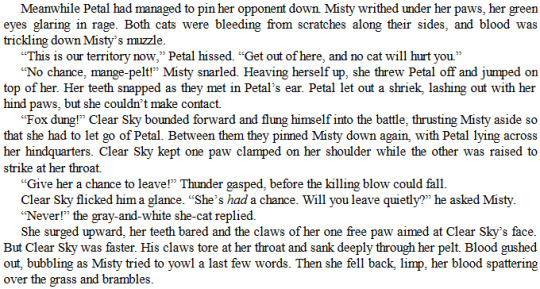
This territory expansion was for no logical reason. There was plenty of food and plenty of land. Any aggression that's happening on this territory is in response to how he's been stealing land and mauling people.
When it's found out she was fighting to defend her children, Clear Sky's immediate response is to slaughter them too.
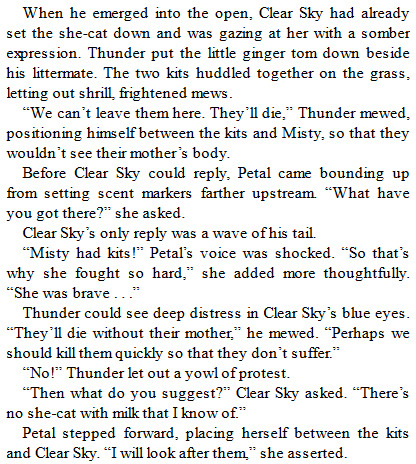
Petal doesn't have milk either. It wasn't about the logistics. He wanted to kill the kids, because looking at them made him feel bad, and she just managed to stop him.
Starvation Rhetoric and the Image of Fluttering Bird
It is often said that Clear Sky is doing this because he's "traumatized" from how his little sister, Fluttering Bird, starved to death in the mountains. That the emotion came from wanting to feed people. That's incorrect. It wasn't about food. Fluttering Bird's death, and all the "starvation" he's faced, are used as manipulation tactics to guilt, influence, and control other characters, particularly when he might meet resistance or be held accountable for something.
It was always, ALWAYS, about control.
He does not care about actually helping people; "Starvation Rhetoric" through Fluttering Bird is an image he can invoke to justify the actions that are as bloody and cruel as the one this post starts off with. Either in his own mind, or in the minds of the cats he's manipulating.
He does this to Falling Feather, before slicing her face open in anger when she doesn't buy it. He does it to Rainswept Flower, before he strangles her to death. And he does it in the chapter just before Misty's murder, both to his Clan and then to Thunder,

Clear Sky climbed up in front of an entire crowd and gave a grand speech about hunger and "adjusting" the borders around territory he plans to conquer. When he gets to "forgiveness" he feigns pain to make his point because he is performing. If the sentiment is not a total lie, then at bare minimum, he is intentionally playing this up for the crowd.
He is rallying the Clan to support his violence against the cats whose land he wants to steal, and selling it with his life's hardships.
The audience is clearly well-trained, because several cats recognize the cue, particularly Frost who is praised for loudly comforting him. This signals "loyalty" because showing your sympathy towards his "suffering" is how this type of emotional manipulation works. It creates a persecuted, righteous in-group.
He's also apparently used this tactic before, since this entire crowd knows what "I Would Never Forgive Myself " means.
He's made sycophants out of his followers. Like a cult leader.
His abused son, however, hasn't been fully indoctrinated yet. Seeing Thunder uncomfortable with the idea of expanding the borders for no reason, Clear Sky calls him over for a personal propaganda session.
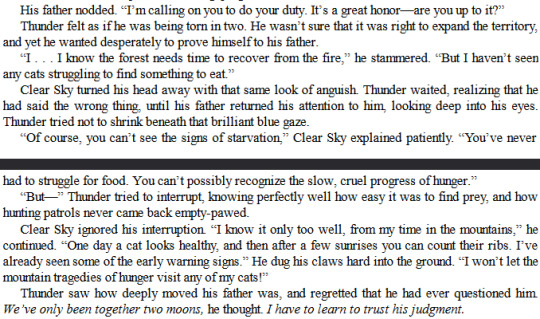
Clear Sky begins the exchange by calling this a "duty" and a "great honor." Immediately framing what he plans to do as righteous.
He puts on the act when Thunder shows resistance, dramatically pausing to let the guilt trip sink in.
"Thunder waited, realizing that he said the wrong thing."
And then Clear Sky launches into infantilizing Thunder, talking down to him like a child who's too inexperienced to see the "signs of starvation," acting like he's being "patient" in "explaining" it.
And then we get it. "I know what starvation looks like (so stop trusting your own eyes) because I have been through more than you (so shut up and do what I tell you), and I'm being a HERO for what I'm about to do (so opposing me would make you a bad person)."
Thanks to these crocodile tears, looking "moved," the act works. The victim is immediately wracked by guilt because the abuser seems genuinely emotional.
He even lovebombs him over the corpse of Misty in the next chapter, making Thunder feel threatened.
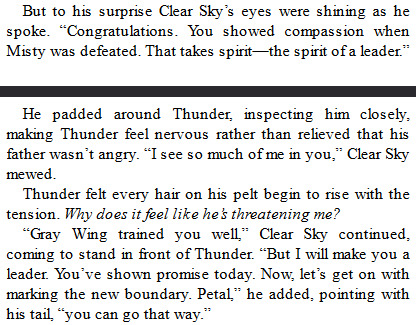
Thunder doesn't have the words to describe what is happening to him, but he knows that this sudden snap to praise isn't natural. That something is very wrong.
A Question.
Before I move on to show that this IS an act, and that he is lying about how important avoiding starvation is to him, I will ask a question. Please think about it, because I promise I mean it genuinely;
Why does it matter if Clear Sky actually believes this or not?
The victims are just as dead either way, yes? Thunder is just as abused and guilt tripped. The entire Clan has been driven towards violence while coddling and cooing at their Supreme Leader. Clear Sky is slowly annexing the entire forest. If you have ever accepted that he had "good intentions" as an excuse for the harm he did, or that abuse and murder was what he imagined was "the right thing," or that his trauma justifies the way he leverages his own pain to make cats do what he wants... why do you think that?
Why does that make it morally better, as the narrative concludes? Would you accept the same for every other WC villain or antagonist? Tigerstar? Slash? Tom the Wifebeater? Brokenstar? Rainflower?
How could you tell the difference, if you couldn't read their actual thoughts on the page? ...are there any other "good intentions" you've accepted, somewhere else?
Don't share that answer with me. It's a question for you. Sit with it.
Hunger as a punishment; he doesn't care about starvation.
...but, regardless, Clear Sky is not deluded about starvation. It's a justification for his obsessive need for control, and always has been. There was no shortage before stealing Misty's land and kits, he is fully aware that there's more prey than they can eat.
He punishes Falling Feather with hunger and harassment for thought crime, by briefly thinking of leaving. But first, he invokes Fluttering Bird at her like he did before, flying into a screeching fit of rage when she doesn't buy it,
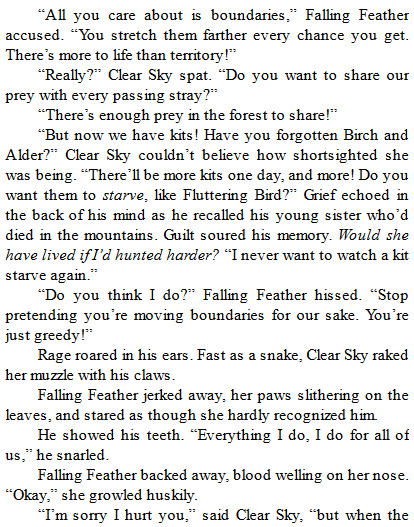
"I'm sorry I hurt you... BUT" is THE wifebeater phrase. THE stereotypical line of a domestic abuser. "I'm sorry I hit you... but it's your fault for making me so angry."
She went through the same exact starvation he did, calls out that he's just framing his greed as being for the collective benefit of his subjects, and is assaulted for that.
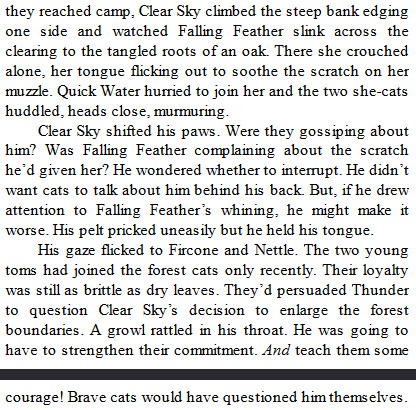
When we're in his head, we see his REAL concerns are not about hunger. He invoked Fluttering Bird to try and make her shut up and bow down to him; what he's focused on is her "gossiping" and "whining" about the open wound he left on her face. He's still furious at Fircone and Nettle for how Thunder QUESTIONED him. So he will "strengthen their commitment."
When "starvation" DOES enter his thoughts, it is to assuage his own guilt and JUSTIFY what he already did. What he already WANTS to do. It's post-hoc.
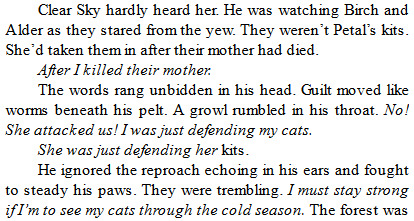
He had to suppress his own guilt at how his greed and ambition made these children into orphans, completely unable to admit that he's ever been wrong or has a change to make, so he invokes the starvation rhetoric at himself to excuse it. So he feels less bad.
Everything, EVERYTHING, in this confrontation is about his pleasure at being able to torment his subordinates. To continue the abuse when the initial confrontation is over. If it isn't pride in his power and control over them, it's plain sadism.
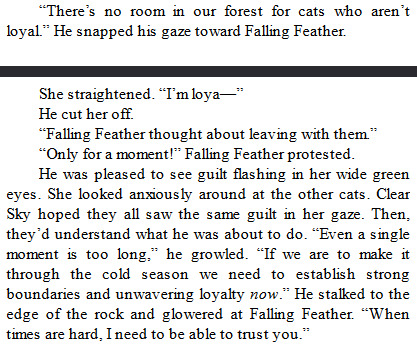
He invokes starvation in front of the crowd, again, after being pleasured at the guilt in her eyes, hoping that everyone sees her writhing with shame and embarrassment. Fear wasn't at the root of why he assaulted Falling Feather; rage was, and now he feels better that he got to humiliate the person who offended him.
Starvation Rhetoric is a manipulation tactic.
It goes RIGHT BACK to his twisted idea of "loyalty." Obedience.
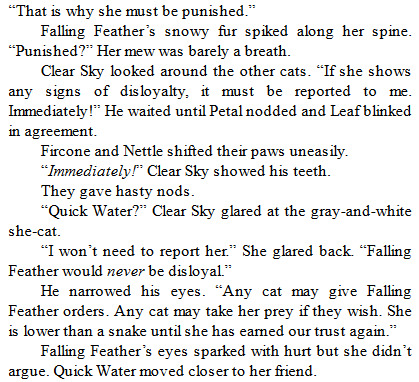
A cat who's actually, primarily concerned about starvation wouldn't encourage other cats to steal her food if they feel like it. He wouldn't be using it as a weapon to retaliate against her because she hurt his feelings.
This is paired with the fact he restricts and monitors the diet of his cats. They eat when he allows it, and only what he gives them, in spite of there being piles of dead animals rotting, going to waste.

We then find he personally doles out food from these piles, plucking carcasses off them and flinging them at his cats, one by one. Probably so he can watch how grateful they are to him and make sure they stay a little hungry-- and definitely because it means he can control WHO gets to eat at all.
If Clear Sky chucked a mouse at Falling Feather and someone took it? She would have gone hungry. For not groveling to him. Like when he decides to starve her brother; a hostage who he promised to feed and care for.
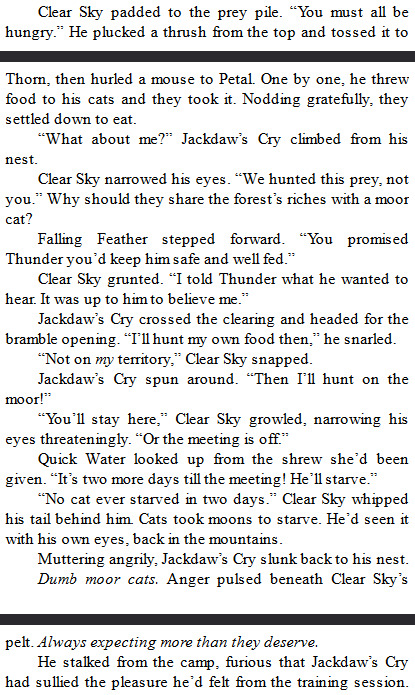
He's a dishonest snake. He lied about abandoning baby Thunder, calling it a "test of strength," he lied about Bumble's death, he lied about keeping Jackdaw's Cry fed.
And he lied about starvation to Thunder, because he was just making up an excuse to steal more land.
He wasn't "seeing the signs" of starvation when he moved to "adjust" his borders. Even FURTHER into this so-called "delusional slip" into tyranny, he's freely admitting that it takes months for a person to starve when it benefits his sadistic need to punish undeserving cats.
"Dumb moor cats, always expecting more than they DESERVE."
Not need. DESERVE. It's not a delusion about starvation and it never was. STARVATION is how he CONTROLS SkyClan, and once again he's angry that his pleasure has been sullied.
The massacre at Fourtrees was started over Jackdaw's Cry catching a bat after being starved, on land that Clear Sky has decided RIGHT NOW that he also owns, because it mades him think about being disobeyed.

The bat is forgotten as Clear Sky pivots into a tantrum, wanting to make his family HURT for being 'disloyal' and 'ungrateful.' For leaving him. He LIKES seeing people grovel, cower, and beg, getting PLEASURE from watching how he can hurt and command other cats, and if you don't give him what he wants he will kill you.
Which, make no mistake, is what the "First Battle" actually is. Clear Sky attempting to murder those who don't worship him or swear their undying fealty to him and his twisted dictatorship. Particularly his own son, the most prominent victim of his emotional abuse.
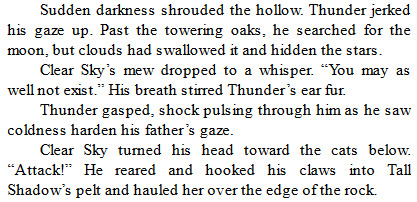

It's not about the bat. It was never even about food or starvation. It's about retaliation for any perceived lack of control.
Once again he breaks out starvation rhetoric to try and manipulate someone, and when Rainswept Flower doesn't buy it just like Falling Feather didn't, he murders her in another fit of entitled rage.
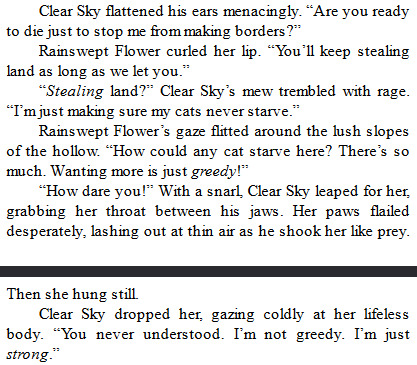
Exoneration arc.
At the end of this battle that was entirely his own fault, we're introduced to the hollowed-out ghost of Storm. She has been flushed of all personality, so that she can be the perfect narrative mouthpiece.
She accepts yet another Fluttering Bird Invocation in spite of how we saw it's not sincere. He was lying the entire time and using starvation rhetoric as a manipulation tactic to get control over his victims.
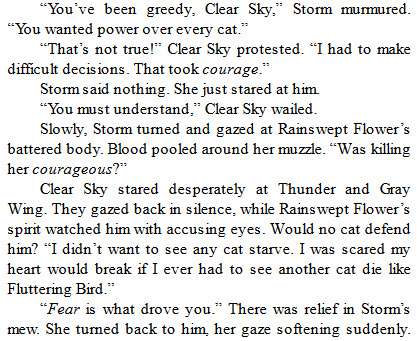
And that's it.
That's the consequence. Storm's a little mad at him until he says "Buttering Flird" and she swoons.
He doesn't have to be ""afraid"" anymore because the cats just invented an afterlife to believe in. He keeps all of his power and influence and gets off scot-free, because "guilt" (which we SAW him repressing anyway) is supposed to be the best consequence for murder, abuse, and tyranny.
The husk of Storm even materializes again at the end of book 5 to say it outright; he "never drove anyone away." Not even after Book 4 where it's also his fault One Eye took over his Clan for 5 minutes. It was just destiny.
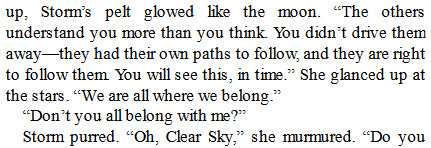
His "redemption arc" is just an exoneration arc. The narrative doesn't think he really did anything wrong.
EVERYTHING about Clear Sky has ALWAYS been about making grabs at power, but since the narrative didn't see a problem with him extorting his personal tragedy and the death of a child, his own sister, he continues doing it. As if these behaviors are normal personality 'traits'.
Even when that sister COMES OUT OF HEAVEN TO YELL AT HIM DIRECTLY,
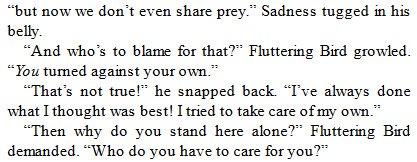
He finds a way to COMPLETELY miss the point, so he can interpret her words in a bizarrely specific way that will conveniently end with him being the supreme dictator of the entire forest. Just like he ALWAYS does.
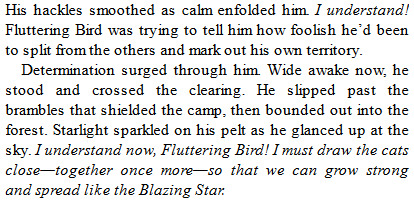
It's the entire 5th book. Clear Sky trying to convince everyone, including himself, that it's Fluttering Bird who wants him to grab at power, NOT himself and his own ambition, that THIS time, he promises, for realsies, it's actually about keeping everyone safe.
But just like ALWAYS, because he does not change, when this tried and true tactic manages to work on Thunder, during ANOTHER exchange where he's dramatically pausing and using the cold shoulder to make his pitiable act land harder,

He lapses right back into bullying his child, creating situations where Thunder will have difficulty or be put in pain, so that he can have an excuse to mock and belittle him.
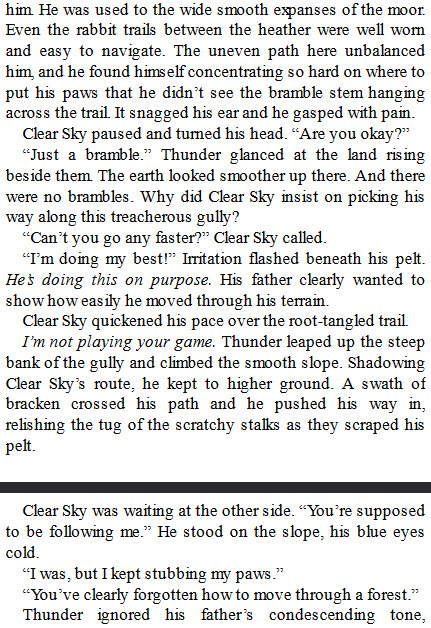
And this all comes to a head when Clear Sky takes romantic interest in Star Flower, his abused son's previous romantic interest.
Predation: Star Flower is a replacement for his son.
Direct parallels are drawn between Thunder and Star Flower. Star Flower contrasts her loyalty to her father to Thunder's "disloyalty" to his own, in an appeal to Clear Sky.
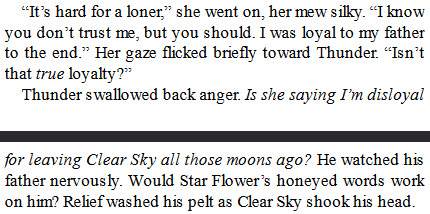
Clear Sky brushes it off for now, citing that he cannot accept her because of who her father was.
But then, Thunder makes the connection between himself and her, because he knows what it is like to be a victim of parental abuse and correctly clocks that they have this in common,

On his vouch, Clear Sky accepts her into the group. She starts trying to offer himself to him; hunting twice as hard as the others, self-imposing harsh conditions like taking a wet sleeping spot. In their second interaction, Clear Sky begins to take interest in her.
Thunder himself points out that Star Flower is seeking an abusive tyrant to replace her own father, which reads like he's deflecting the stress of how his father is abusing him to deny a connection he already made. As if Thunder sees so much of himself in Star Flower that it makes him (rightly) feel sick that his father is romantically invested in her;

Thunder then goes on to follow his own advice and form his own Clan, because Clear Sky IS like One Eye... while Star Flower remains here. At Clear Sky's side. Because she feels like this is what she "deserves," that she "understands" him, truly believing that her crime (warning her father that Clear Sky brought an ambush in case he lost the 1 on 1 death match he requested, which he did) are on the same level as his abuse and murders.
Clear Sky is attracted to Star Flower because, in his own words;

She is young.

She will not betray him.

She won't question him,
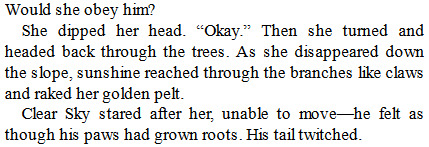
and she obeys him.
We've seen what "betrayal" is to Clear Sky-- not taking his excuses or his beatings. To "disobey" is betrayal. To "question" is disobedience.
These are ALL things he's tried to drill into Thunder. We saw him happily exploit their difference in age to tell him he can't have an opinion. He constructed humiliating games in retaliation for ever being questioned. He tried to murder Thunder and his friends for their "betrayal." Even now, being disobeyed causes explosive reactions.
He was previously grooming the things he now identifies as attractive in a young woman into his child.
If your body becomes too useless to serve him, like Frost and Jagged Peak, you're thrown out. If you don't unquestioningly follow his bloody commands, like Falling Feather or Thunder, you're subjected to abuse and public humiliation. If you're in his way, like Misty or Rainswept Flower were, you die.
If you meet all of his expectations...

You will be in a horrific position where you will never have agency over your own life ever again. Every move, every word, will have to be carefully crafted so that he feels like you're "loyal" to him by the arbitrary standard he feels that day. Never step out of line, never doubt his decisions, never live for anyone except him and the children you will give him, not even for a moment, because then you will not be "worthy" of his grace.
Star Flower would be in serious danger if this series wasn't written by abuse apologists. They accidentally wrote a perfect reflection of how child abuse victims often find themselves in unsafe and toxic romantic relationships with large age gaps which mirror what they went through as kids; but this team doesn't clock it, playing this relationship as wholesome and genuine.
He finally has someone who ""understands"" him. Because they think the character they wrote is misunderstood.
but reality is plain to see.
Clear Sky is a monster. The most realistic monster in all of WC-- far, far closer to real life predators and domestic abusers than the "born evil" rogues like Slash and One Eye. The Erins seem to believe that what separates Clear Sky from One Eye is "fundamental" good and "fundamental" evil, when the truth is that they'd be separated by very, very little.
If they had realistic motivations, they would be exactly like the character their existence is meant to excuse.
Slash and One Eye HAD to be kept flat and one-dimensional. If the book was more earnest, the only difference between Clear Sky and One Eye would have been that One Eye is stronger. So strong that Clear Sky needed to manipulate the other groups into helping him.
While anyone can change, not everyone will, and Clear Sky has no reason to. He sees no consequences. He has everything he wants; power, a pretty and obedient young mate, and unchecked authority over a brainwashed forest cult. There is always a victim on a leash, a naive enabler, or a bunch of desperate and gullible marks somewhere in his proximity to bully into doing his dirtywork
Whether his "intentions" were sincere or not (evidence points towards not) at its root it was always about control. Power is something he perpetually keeps, and continues to violently use.
#Cw incest#Incest implication#Child abuse#Cw child abuse#Domestic abuse#Cw domestic abuse#Clear Sky#Warrrior cats analysis#Clear Sky wc#Star Flower#Dotc hate#Star Flower wc#Thunderstar#Cw Abuse#Abuse#Cw grooming#Grooming#Ask to tag#I know this is a really fucking heavy one#I had several people read this for me beforehand to double and triple check what I'd written.#And im relieved that it's finally finished.
461 notes
·
View notes
Text
JoJoFromJerz's Are you f'ng kidding me? Substack:

Facts: January 6th was not a regular tourist visit, it was not legitimate political discourse, it wasn’t peaceful or patriotic, it wasn’t perpetrated by the deep state, the FBI, Antifa, drag queens or furries. Those who attacked the Capitol are not “heroes”, “patriots” or “warriors”, and Ashli Babbitt is not a martyr. It was a violent and deadly domestic terror attack intended to assuage the battered ego of a madman loser which was fueled by a perpetual proliferation of lies and conspiratorial propaganda in an effort to stop the certification of the 2020 election.
Which. He. Lost. It was incited by Donald Trump, perpetrated by HIS rabid cult, and it claimed the life of Ashli Babbitt because she CHOSE to threaten the lives of members of Congress and she was stopped in that effort by a police officer’s bullet. No matter how many times MAGA tries to rewrite the events of that day, no matter how they water it down, downplay or diminish it, we still have the truth. We still have what we saw with our own eyes, what we heard with our own ears, we can still see the physical scars and we can feel the emotional trauma the officers on the ground that day carry with them as we speak. January 6th was a very dark day for this country. It’s not a matter of comparing it to any of the other dark days we’ve walked through or endured. There’s no definitive list of the worst days we’ve ever known.
There was a physical attack on the citadel of our democracy, and it was horrific, but it was the intentional and deliberate attack on the bedrock principles of our Democracy itself which has forever scarred this nation. Yes, we ultimately prevailed that day. The attack was thwarted. The physical threats were put down, and the rioters were jailed. Unfortunately however, the more insidious side of the goal of that day has not yet succumbed to the efforts to squash it. Quite to the contrary, those behind the attack are more determined and more emboldened than ever. Their objectives are the same, even if their tactics and language have changed. They are still coming for our Democracy. They are still seeking to destroy what it is that makes this little experiment of ours so uniquely special.
Former Wisconsin Gov. Scott Walker (R) posted on X that “voters are long over January 6th.” Walker is wrong, as lots of voters aren’t “over” that day.
#Scott Walker#Capitol Insurrection#2024 VP Debate#2024 Presidential Election#2024 Elections#JoJoFromJerz
136 notes
·
View notes
Text
Good Omens S2
Okay so.
Excellent Job, Gaiman
Ouch???
I don't like to publicly talk about my personal life. My academic life is my professional life is my artist life. But my personal life? Not so much, outside of vignettes.
But for the past several months, I've been deconstructing a lot of personal baggage and trauma surrounding both family and religion, after leaving the cult I was raised in (mormonism).
It's terrifying to realize that the framework you built your entire self on is false. It's exhausting and painful to deconstruct that framework, to disentangle your identity in the way that won't destroy you.
And it's slow.
Nobody ever tells you how slow it is to heal. You can't control the rate you heal either. You just have to be patient with yourself, and give yourself an environment where that healing can occur safely and naturally.
Anyways.
Good Omens, and its weird tendency to be exactly what I need when I need it.
I first read Good Omens in high school. And honestly, I didn't quite get it, at the time. I only knew it was different from every other book I've ever read, one that didn't treat religion as stupid or trivial, but also one that called out the blatant hypocrisy and control tactics involved. It helped me safely challenge a status quo I hadn't even realized existed.
I first watched Good Omens partway into my Master's Degree. It was everything that I could've hoped for. I understood the book a lot better, but the TV adaptation captured my struggles with mental dissonance, trying to understand and accept the parts of my identity that I was taught God didn't want.
I watch S2 a year into my doctoral program. I'm out of the cult, and it's exhilarating and painful and scary and fun, but I can still feel the scars its hooks left when they were torn out.
I feel like S2 Aziraphale is in about the same place. He's exploring his freedom, but also trying to reorient himself. He's trying to let himself be. He's healing, but his boundaries got overridden due to circumstances out of his control (naked Gabriel). He's been pulled back into the gravity of the abusive system he tried to escape, given a carrot on a stick, and isn't yet healed or strong enough to resist.
On top of that, Aziraphale is still holding onto the hope that the problem was bad individuals, not a corrupted system. He thinks if the leadership is different, things can change. He thinks if he had more authority in the system, he could make things change. And... that's not how it works.
And Crowley. Dear Crowley.
He wants Aziraphale to be farther along in his healing than he is. Honestly, Aziraphale wants it too. But again, you cannot force this kind of healing, even when it results in a loved one making some truly stupid decisions.
Crowley sees the system for what it is. He's already deconstructed that part. But he hasn't really started addressing his own trauma. He's hinged his entire existence on Aziraphale, on being what Aziraphale needs, that he hasn't allowed himself to heal either. And Aziraphale, who is vulnerable and healing, is not able to provide the support that Crowley would need to recover safely.
Which is why them separating is probably the best thing for both of them.
It won't be permanent.
But they don't communicate, and their relationship while delightful and beautiful risks unhealthy codependency that prevents either from really growing or healing.
Anyways, what I really hope to see next season is Aziraphale's realization that the system never had his back. That the system is what's wrong, and that he can't win by playing at respectability politics or gaining a higher status within it.
I want Aziraphale to get angry.
He deserves it. He's tried so hard. He thinks he's lost Crowley over it.
I want him to feel the gut-wrenching despair of realizing how conditional and fleeting the system's version of love is, and I want it to turn into a rage.
But not a destructive rage--the sort of anger that Pratchett ascribes to himself and many of his works. The sort of anger that fueled Discworld and Good Omens. The sort that can be finessed into a weapon and a shield, that can be used to protect the people who truly love you.
For millennia we see Crowley fighting for Aziraphale.
For Season 3, I want to see Aziraphale fighting for his demon.
For him to apologize, without the expectation that Crowley will come back, but because he was wrong and Crowley needs to know it. To not expect forgiveness, not even think he deserves it.
And then for Crowley--who is trying to hide his heart eyes at seeing his avenging angel coming to save him for once, who he can tell immediately has changed, and is finally going Crowley's speed)--for Crowley to give that forgiveness, without strings attached.
#good omens#good omens 2#good omens season 2#good omens spoilers#good omens season 2 spoilers#aziraphale#crowley#anthony j crowley#long post#text#religious trauma#religious abuse#recovery
901 notes
·
View notes
Text
I think one of the more insidious beliefs I had to deconstruct imo is that "negative" emotions, especially anger, are sinful/bad. It's not beneficial to believe any emotions are inherently evil and need to be avoided at all costs, but anger specifically gives information about mistreatment, injustice, boundaries being crossed, disrespect, etc. People that are dissociated from their anger are that much easier to control. It's much easier to get away with harming people that struggle to identify when they're being harmed, and who can easily be called "sinful" when they do identify it.
#especially when the implications are basically you don't deserve to be angry because you're evil for existing#and the like “all sin is actually against god so it doesn't matter how it harmed you”#emotion control#ex christian#religious trauma#ex cult#cult tactics
301 notes
·
View notes
Text
Regulus Black.
The boy who cracked Voldemort’s secret, turned against the Dark Lord, and gave his life to strike a decisive blow for the greater good. Sounds impressive, right?
But don’t let the fanon fever dream—or the Chalamet cheekbones—fool you.
1. The Fanboy Who Bought His Own Propaganda
How did Regulus get into this mess in the first place? He wasn’t dragged kicking and screaming into Voldemort’s inner circle. He wanted it. This was the boy who looked at Voldemort’s genocidal cult and thought, “Yes, this is my moment.” Voldemort wasn’t just a leader to Regulus—he was an idol, a pure-blood messiah, promising everything Regulus had been raised to worship.

His parents weren’t even Death Eaters themselves. Walburga and Orion preferred to clink their glasses from the sidelines, content to watch the chaos from their pure-blood balcony seats.

But Regulus? He wanted center stage. For him, the Death Eaters weren’t a prison—they were a playground. He signed up for the dark glamour, the exclusivity, and the chance to be on the frontlines of Voldemort’s “vision.” Regulus wasn’t coerced or manipulated—he was all in, fully convinced he was playing for the winning team.

Until, of course, Voldemort stopped being the star of Regulus’s dark power fantasy. And when reality set in, Regulus had a change of heart. But did he admit, “I was wrong”? Did he stand up and fight for the people he’d helped oppress? No. He folded.
2. The Master Plan That Wasn’t
Regulus was practically spoon-fed the truth about the Horcruxes. Voldemort’s most guarded secret was gift-wrapped and dumped at his feet, courtesy of a tortured house-elf.


And this wasn’t just any secret. This was the kind of revelation that could’ve turned the entire war around. But instead of responding with precision, foresight, or even basic competence, Regulus managed to botch it at every possible step.
Step 1: He stole the locket.
Stealing the locket sounds like a bold move, right? On paper, it’s the kind of Gryffindor-level defiance fandom loves to romanticize. But in reality, it was a tactical nightmare.
Regulus didn’t just take the locket from a location Voldemort’s obnoxious ego would’ve eventually exposed. No, he took it and hid it in Grimmauld Place.
Instead of leaving it in the cave, where someone might’ve uncovered it, Regulus thought, “You know what? Let me stash this in my creepy ancestral house, where only my guilt-ridden, traumatized house-elf knows it exists.” Revolutionary thinking, truly. Because when dismantling a Dark Lord’s immortality, the best plan is obviously to make the Horcrux even more inaccessible, right?
The only reason the locket ever surfaced was because Harry inherited Grimmauld Place. If not for that stroke of luck, the locket would’ve sat there, untouched and invincible, for decades. Maybe centuries.
Or worse—as we saw happen in canon—it could’ve been stolen, passed from hand to hand like a cursed trinket, and lost forever. Voldemort would’ve cackled his way to world domination while the wizarding community fought a battle they couldn’t ever win.
Step 2: He didn’t destroy it.
Destroying a Horcrux isn’t easy—I’ll give Regulus that. But did he even try? Or did he just hand the locket to Kreacher with the world’s vaguest instructions, essentially saying, “Figure it out, sweetie,” before marching off to die dramatically?

Kreacher, bless his loyal, trauma-ridden heart, spent decades torturing himself trying to destroy an indestructible object with no tools, no guidance, and no real chance of success. He tried everything he could think of, punishing himself endlessly for failing a task that was never within his power to complete.
Regulus doomed him. Instead of empowering Kreacher to carry out his wishes, Regulus turned his act of “redemption” into a lifelong burden for someone who had no choice but to carry it.
Step 3: He told no one.
Now here’s where Regulus truly shines in sabotage disguised as sacrifice. Whether it was arrogance, misplaced pride, or a refusal to meaningfully contribute to Voldemort’s downfall, he ensured that the secret he uncovered—the one that could have turned the war on its head—was buried right alongside him.
Perhaps the poor boy couldn’t stomach the idea of contacting Dumbledore or joining the resistance. Maybe the thought of lowering himself to grovel before the Order, confessing his sins, and actually helping was too much for his delicate pure-blood ego.
But what, then, compelled him to entomb such precious knowledge alongside his corpse? Would it have killed him—again—to ensure Kreacher delivered the locket and its significance to someone who could actually do something about it?
Instead, Regulus left behind nothing but a moody breakup note to Voldemort that helped absolutely no one.
“I hope you will be mortal once more.” Oh yes, that glorified Dear John letter. Maybe he thought his scathing parting words would haunt Voldemort forever. Perhaps Tom was meant to reread it late at night, questioning his life choices.
3. What Could Have Been
Regulus had options. So many options. The fact that he chose the least effective course of action is almost impressive in its sheer incompetence.
He could’ve swallowed his pride and gone to Dumbledore. Say what you will about the man, but Dumbledore was Voldemort’s greatest fear for a reason. Armed with Regulus’s intel, Dumbledore could’ve started breaking apart the Horcrux network years earlier, crippling Voldemort before Harry was even born.
He could’ve warned the Order. Regulus could’ve shared this revelation with his brother. He could’ve even scrawled a quick, anonymous note: “Voldemort made Horcruxes. Here’s one.” That alone could’ve shifted the entire war.
He could’ve destroyed the locket himself. With access to cursed objects, forbidden magic, and centuries of pure-blood knowledge, Regulus had the resources to figure it out.
If Regulus had simply done nothing—if he had left the Horcrux untouched in Voldemort’s lair, waiting for someone more competent to find it—it still would’ve been a better choice than what he did. At least then, it wouldn’t have been stashed in a location even less traceable than Voldemort’s own cursed lake.
4. The Fallout of Failure
Regulus didn’t just fail—he left behind a colossal mess for others to clean up.
Kreacher suffered for decades. The loyal house-elf blamed himself for a failure that was never his fault. Regulus didn’t just abandon the locket—he abandoned Kreacher to a lifetime of guilt and self-inflicted punishment.
The Order fought blind. Deprived of any knowledge about Voldemort’s Horcruxes, the Order spent years floundering in the dark, waging desperate battles against Death Eaters while the true key to victory—Voldemort’s immortality—remained untouched.
The Trio cleaned up his mess. Harry, Ron, and Hermione spent months hunting down a Horcrux that could’ve been destroyed decades earlier. Their entire mission to find and destroy Voldemort’s Horcruxes was prolonged and made infinitely harder.
5. Fandom’s Saint of Aesthetic Suffering
In the end, Regulus was just a boy who stumbled onto a world-shattering discovery, fumbled it completely, and left behind a legacy so utterly useless that it took sheer dumb luck to untangle long after his dramatic exit. Regulus’s actions didn’t just delay Voldemort’s defeat—they actively sabotaged the resistance.
But none of this matters. Fandom doesn’t love Regulus for his actions—it loves him for his aesthetic.
A brooding boy with tragic eyes, a flair for melodrama, and three vague lines of backstory ripe for fans to twist into epic sagas of angst and redemption—and to demand the rest of us bow down in worship of their self-styled martyr.
72 notes
·
View notes
Text
In the past, I’ve spoken AT LENGTH about Hobie Brown’s dialogue lines, and it’s because I think every single one of them are interesting on their own level - each telling us more and more about his character.
I’ve almost gone through them all - ALMOST. But if there’s one line that I find to be super interesting - and super misunderstood - it’s this one.
What does Hobie mean by - “Eh, What of it?”
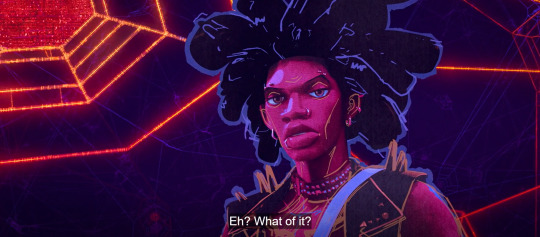
It’s one of his shortest lines, but I think those four little words can tell us a lot about Hobie, not because of what he said - by WHY he said it.
Often when people reference this line, they say that this shows that Hobie is unaffected or apathetic to canon events - either as a whole, or his own. We usually assume that this is some insight into his background in some way.
But I think this might be something else. Would you believe that this line was him looking out for Miles?
It’s been a while, but hear me out on this. So the question I’m answering today is - ‘Why does Hobie say this? And what exactly is he trying to tell Miles?’
[A SHORT-ish essay where I break down one of my favorite of Hobie's lines. Because I miss writing essays lol]
---------------------------------------------------------
Now, I know we all know the context of this scene - we’ve probably seen it dozens of times now - but I just want to reiterate why we’re here in this moment and what’s happening, just so we can begin to get inside Hobie’s head.
The scene takes place shortly after Miles meets Miguel, and in order to explain, Miguel gives Miles a seemingly rehearsed speech starting with ‘This is Everything.’ The ‘Everything’ speech is a basic introduction to the Spider-verse, to canon events and how they bind all Spider-people together.
At this point in time, Miles has not mentioned his father or his incoming canon event. And Miguel has made no indication that he plans to tell Miles that he’s an anomaly - there’s no reason to, so long as Miles plays along.
So from what we can tell, this speech is something every Spider-person gets.
But what exactly is Miguel trying to do?
I think it’s safe to say that The Spider Society is a cult of personality in many aspects - but not towards Miguel - but towards Spider-man as an entity or, more accurately, an identity.
And in this moment, he’s trying to portray the personal tragedies of Spider-people as a part of a bigger narrative. Miguel is showing recruits that their trauma is not just an individual scar, but a collective one shared for the greater good.
Sounds cultish? Well, because it is. There are many ways you can explain this, but I think Psychology Today’s article ‘Understanding Cults’ says it best.
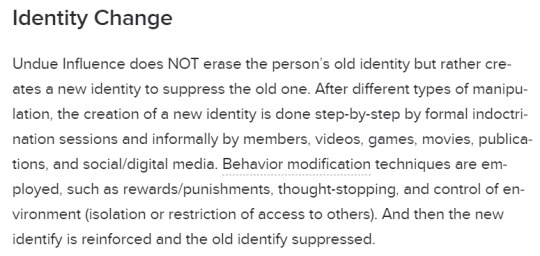
What does that have to do with Miles?
Miguel is showing Miles his trauma along side all others as a way of ‘creating’ or solidifying his new identity as Spider-man, in order to suppress his own identity as Miles Morales. In order for Miles to submit to canon events for the ‘greater good’, he must choose his identity as Spider-man over his individual identity of Miles Morales.
He shows Miles’ his own canon event, beside dozens of other Spider-people facing the same trauma, in order for Miles to feel included, apart of something bigger than himself. This, of course, is a common tactic of real life cults - the prevailing idea that the victim is apart of a larger, inescapable - often religious - narrative within the universe.
In this moment, Miguel is trying to thread Miles into the fabric of the Spider-verse, in hopes that in doing so - Miles will be more inclined to submit to the tragedy of canon events.
In short, he wants Miles to feel guilty and sorry for those around him.
And it’s working.
Let’s look at the sequence of events in this moment. Miguel introduces Miles to ASM-90, the Death of George Stacy. As soon as he hears the words ‘Captain Stacy’ - Miles looks to Gwen. We can see the concern on his face, and the somberness on Gwen's. Already he is starting to feel the weight of the others’ emotional reactions.
Next, he looks to his most trusted person - Peter B.
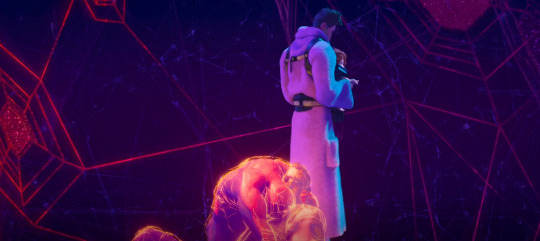
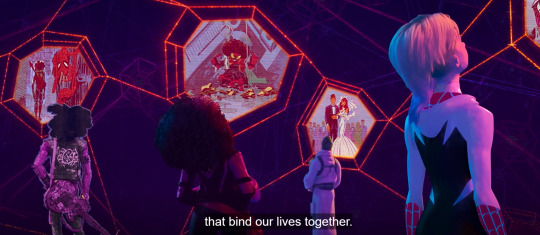
Already, Peter B. is facing away, clutching Mayday to his chest. We don’t just get a shot of Peter B’s back - but we also get a shot over Peter’s shoulder. And we see Miles, and his growing worry. This shot signifies, to me, that this moment isn’t just about the canon events of each character - but Miles’ emotional reaction to it.
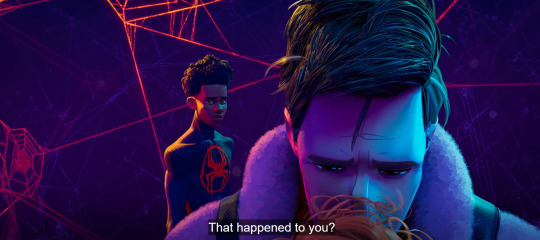
Miguel’s tactic of guilt-tripping his working. Because look who speaks next.
Miles says to Peter B. - “That happened to you?” - But it’s not Peter who responds. It’s Jess. Undoubtedly, Miguel’s biggest ally in the room. Jess says to Miles -
“And me.”
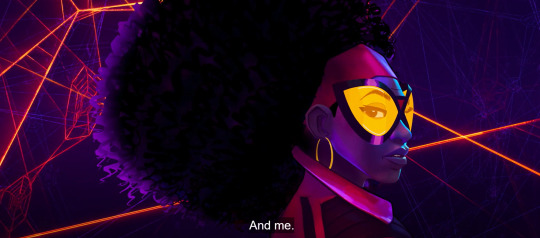
Jess works for Miguel. And in that moment, it seems like she’s trying to drive home the point that this whole presentation is about. I mean, think about it.
If we are to believe that this speech is a routine one, given to new Spider-recruits to tell them about the existence of canon events, then Jess saying this ALSO isn't unique to Miles. Her saying this, her reiterating Miguel's underlying point in all this -
‘We’ve all faced your trauma - we’re all like you.’
In this moment, we don’t ever SEE a shot of Jess’s canon event - because that’s not the point. We see Miles’ reaction, because that’s what this is truly about. Miles’ feelings, his emotional connection to these people, in order to manipulate him into empathy - and conformity.
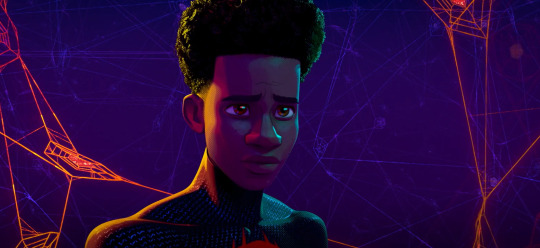
But then we get to Hobie.
“Eh, What of it?”
As always, Hobie stands out of the crowd.
He’s always the one to think differently and to choose his words carefully. And we know for a fact, he’s always on Miles’ side.
When we watch this moment, many people assume it’s some insight to his background. That maybe Hobie was responsible for his own canon event, or have grown apathetic to the idea as a whole. And while those are interesting theories - I think the answer is much simpler.
Hobie isn’t saying “What of it - what happened to me isn’t a big deal.”
He’s saying - “What of it? What does any of this have to do with YOU?”

Think about it, most times we say ‘What of it’, it’s meant to mean ‘what relevance does that information have?’ or even ‘why does it matter?’
Let’s look at an example. Let's say someone eats your friend’s powdered donuts, and your friend questions the group, looking for the culprit. Someone might say ‘X, your favorite food is powdered donuts!’ X might say ‘Yeah, and what of it?’ - as in ‘Yeah, but what does that have to do with anything?’, as a way to show that the information being mentioned is true, but also doesn’t affect the situation.
And that’s exactly what I think Hobie is saying.
Hobie isn’t downplaying his own trauma but saying ‘What of it?’, he’s telling Miles - “Okay, but what does all of this have to do with anything?”
What does their canon events have to do with Miles, and his feelings? Why should Miles have to take on their trauma and their pain, when he just got there?
Hobie knows that Miles followed Gwen, and that him and Gwen care about each other deeply. Upon their reunion, Hobie can see that Miles looks up to Peter - he knows that seeing them in emotional pain hurts Miles too.
And Miguel knows this as well. Miguel probably knows that the best way to convince Miles is through Peter, and Gwen.
But that shouldn’t matter. Miles shouldn’t have to relive their tragedies in his own life just because they went through it. He shouldn’t feel guilty for trying to be different or choosing his identity over the mold Miguel is presenting him.
Sure, Hobie might’ve been hurt in the past. He might still be hurting - but this isn’t about him, it isn’t about any of them.
It’s about Miles, so what does his pain have to do with it? Why should Miguel get to bring up their trauma, and make them rewatch it, for the sake of pulling Miles’ heartstrings?
Why should Miguel get to weaponize their canon events for his agenda of getting Miles to conform? What they’ve been through has nothing to do with it. And Hobie knows this.
So literally, ‘What of it?’
In this moment, Hobie isn’t focused on himself - he’s focused on Miles. So when he says ‘What of it?’ this isn’t a comment on his past experiences, it’s a comment on Miles’ current predicament.
‘Yes, that happened to me, but what does this have to do with you, Miles?’
This interpretation follows the characterization we've seen of Hobie this far.
All of his words to Miles are chosen carefully, all of his words are there to back Miles up - and support him in some way. It’s all Hobie’s thinking about.
And we can see it in Hobie’s face.
Back to the scene. Jess says “And me.”
For a second, Miles’ eyes lingers on her. But after a moment, his eyes goes to Hobie. Hobie, the guy Miles has already decided is cooler, more level headed, a friend of Gwen. Already in this moment, Miles it looking to Hobie’s reaction because he no longer sees Hobie as a threat. In this moment, he’s looking to Hobie for support.
But look at Hobie’s face.
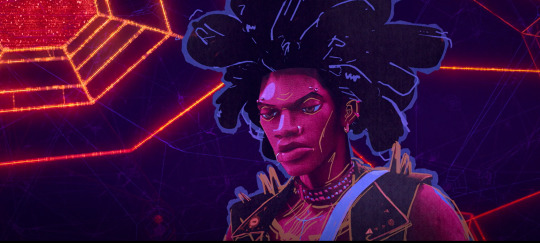
For a moment, he looks visibly somber. For a split second, we’re shown the emotion on Hobie’s face, he’s looking down, lost in thought. [I'm screaming iAHHH i want to know what happened to him SO BADLY he looks so sad :((( I'm gonna cry but also I'm editing this drunk so I'm extra emotional :((( Sad Hobie :((((]
And then he realizes that Miles is looking at him.
But why would the animators show us that, if he truly didn’t care about his canon events? What would be the purpose of this shot?
I believe this split second shows that maybe, just maybe, Hobie does have scars from his canon events, ones he still thinks about, ones that still illicit and emotional response from him.
But when Miles looks at him, immediately, his expression changes.

He tucks away his feelings and returns his attention to Miles. He chooses to set aside his aside his trauma, to play it off and hide it away, because he knows that if he doesn't - Miles will internalize that pain, and that guilt.
In that moment, Hobie can tell that Miles is looking to him for some reason. And that reason is support.
In that one moment, Hobie takes the chance to push his own trauma aside - to be the voice of reason for Miles. The voice to tell Miles that ‘whatever happened to us, has nothing to do with you’.
By saying "Eh, What of it?"
These four words, often thought to be Hobie playing it cool, could be so much more.
It could be one more push to Miles to choose his own path - and it echos back to Hobie’s first monologue to Miles:
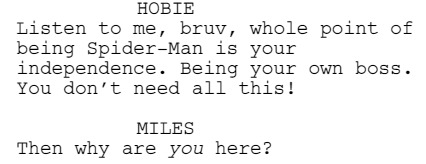
In this moment, Hobie chooses to remind Miles, that this isn't about them, or what any of them have been through.
It's about him, and his independence. Hobie is imploring Miles to reject Miguel's narrative - to reject the collective identity of Spider-man.
Because to Hobie, that's what being Spider-man means. Independence, and individuality. He doesn't want Miles to carry his burden, or anyone elses.
And I think this line is the perfect example of that, it shows the depth of Hobie's dedication to Miles, and what Hobie believes in.
________________________________________
In every scene, in every shot, and every line - Hobie is looking out for Miles in anyway he can. And although this theory doesn’t tell us much about his past, it re-enforces who Hobie is as a character: an agent of good and a driving force in Miles’ story.
Maybe Hobie does have canon events he’s still grappling with, and skeletons in his closet. Maybe we’ll one day understand the meaning of his blue laces. But in that moment, none of that mattered. This is Miles’ story, not theirs’, and Hobie knows this.
And that’s true punk tactics. I love Hobie Brown so much i could cry AHHHHHHHHHHHH
_________________________
SOOOOOOO I know it’s been a while but if you read this far - THANK YOU SO MUCH. Sorry if I’m a bit rusty at this, but this is something I’ve been wanting to write about for months now! And Im SOOOO happy its finally done GOLLLY JEEEE
Anyway, here’s Hobie. Bless up.
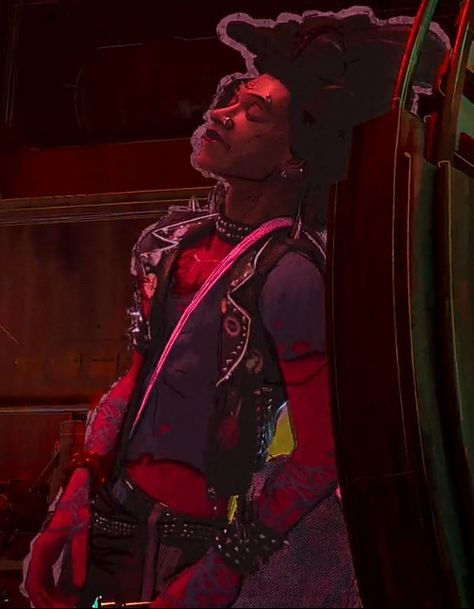
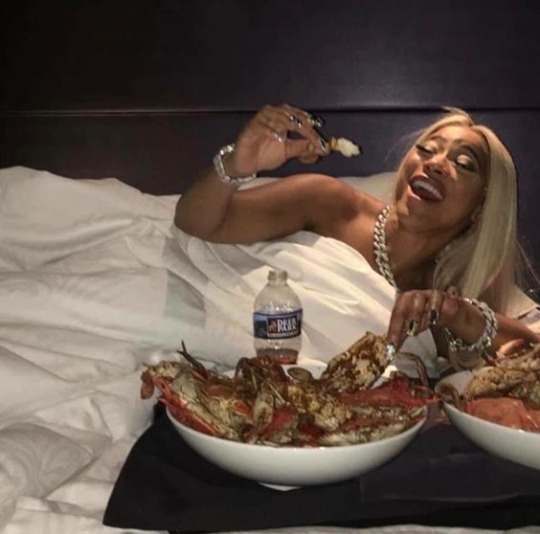
(right is actual photo of me writing this drunk as hell in my bed lmaooooo im so turnt right now Im sorry if this dont make sense anywayyyyy hes so fine whys he so perfect Hobie I Love YOuuuu wtfffff)
BYE.
#god i love him so much#i love him so so so much#spiderman#atsv#spider man#marvel#across the spiderverse#spider punk#hobie brown#spiderpunk#atsv analysis#meta#meta analysis
144 notes
·
View notes
Text
what bothers me about horde prime, more than his lazy characterization or his lack of impact on the narrative, is the fact that he is such a bad representation of a cult leader. like,, this is not how cults work. they don’t just insert a chip into you and make you follow their every directive like a robot. real life cults are a lot more terrifying because they use manipulation as a tactic to convince people to join them. it’s not a digital chip that you can remove from your system and suddenly you’re in complete control of yourself. cult survivors have talked about how hard it is to actually unlearn that mindset and start thinking for themselves, how many years it takes to stop feeling guilty for leaving their cult or seeing the toxicity in the leaders they so religiously followed.
sure, hordak and catra have some trauma tied to their experience with horde prime, but most of that is because of the physical torture they went through, rather than their experience of being brainwashed. and it’s fine if horde prime was just some villain and not a genocidal cult leader. but it’s clear that he was written to be a religious authority figure, the execution is just so off.
i know he’s a character in a fantasy world, so he had to use his powers for something. but instead of turning people into robots, he could have shown them a “better world” through his tech, talked them into joining him and forgetting about all their current worries, and then used them as weapons against etheria.
it would have been a lot more impactful and angsty if catra had willingly joined horde prime’s cult so that she could repress her guilt. in fact, it would have been really interesting if horde prime had convinced catra that he would help her repend for all that she did, if she joined his cult. this would have been a lot more comparable to religious guilt and trauma in real life, and it would show that catra actually felt bad for what she did, instead of just looking sad for a while and then continuing to be a shitty person anyway.
#everyday i mourn the character horde prime could have been#he could have actually been representative of toxic religious figures who push unhealthy mindsets#instead of being all “heehee you love adora dont you” he could have been like#“i sense guilt. you’ve done a lot of horrible things and you want to take it all back but you can’t. at least you think you can’t.#but if you join me you can repend for all your sins. dedicate yourself to me and i’ll make sure you’ll never feel like a bad person again.”#and it sounds like escapism because it is#halfway through catra begins to realize this and she has to choose between repressing her guilt#and actually allowing herself to feel guilty so that she can work on being better#and instead of having adora rescue her catra rescues herself by making a hard decision#but alas#spop critical#spop salt#spop#spop discourse#spop criticism#she ra#anti spop#tw religious guilt#tw religious trauma#tw religion#tw cult
61 notes
·
View notes